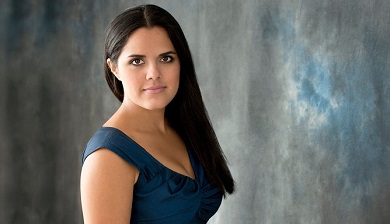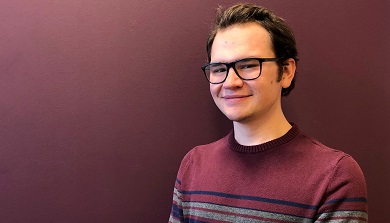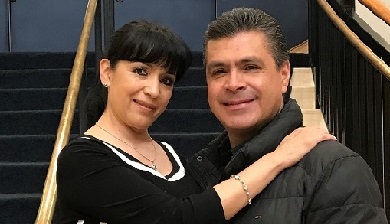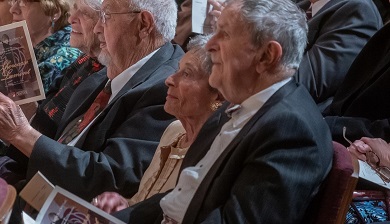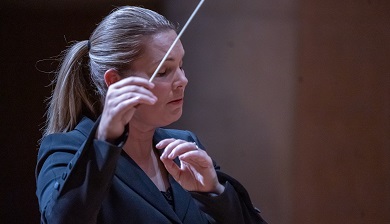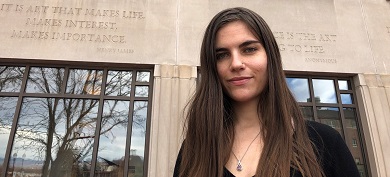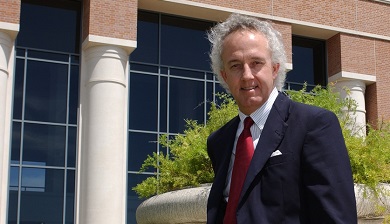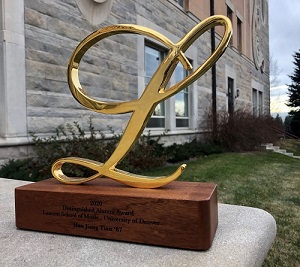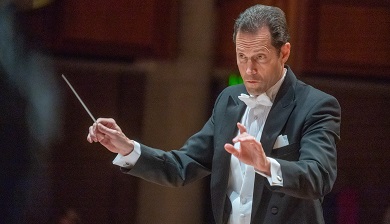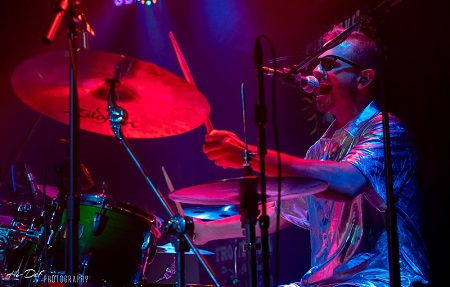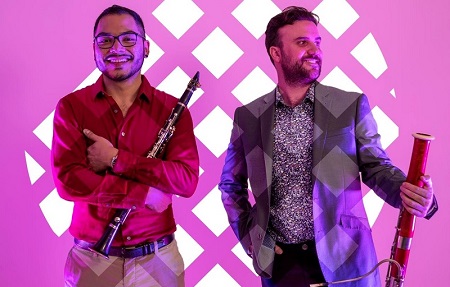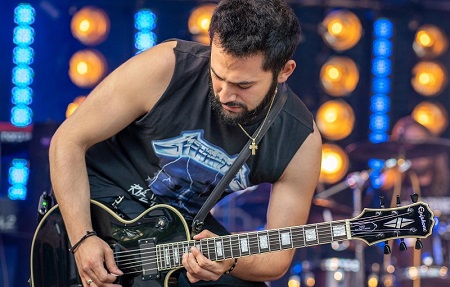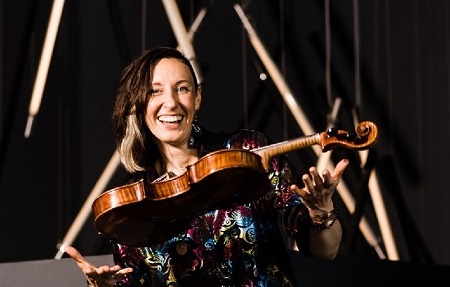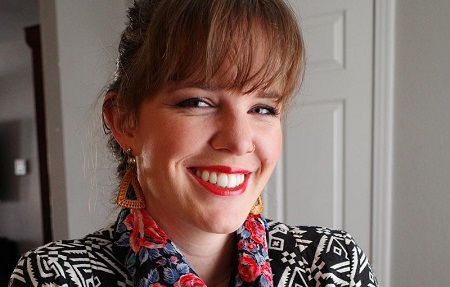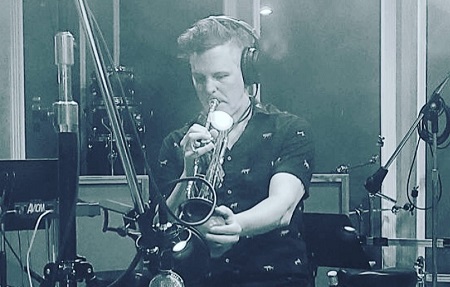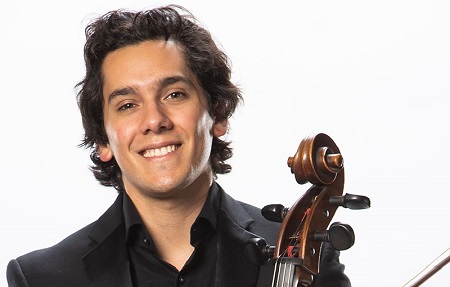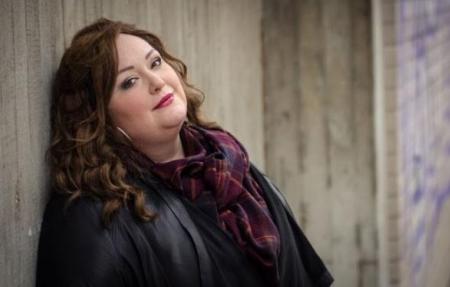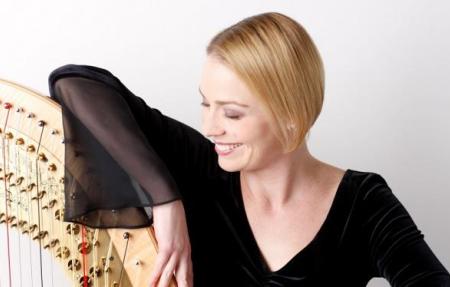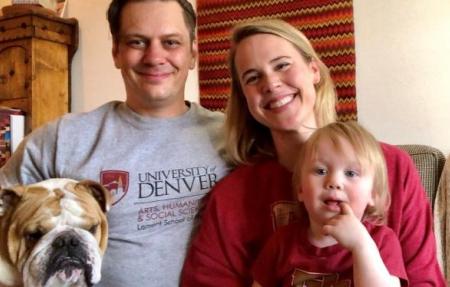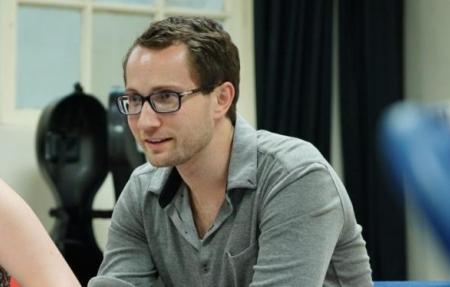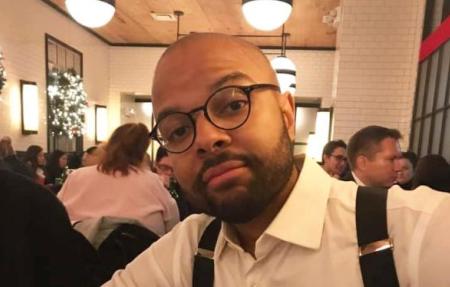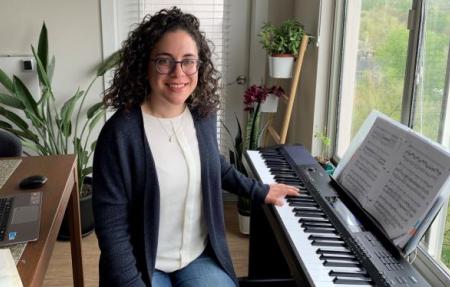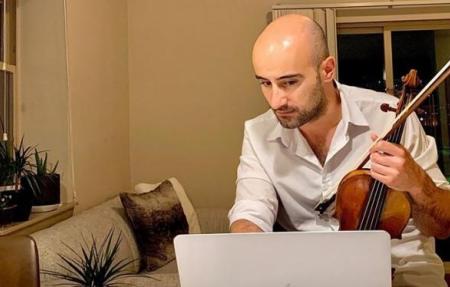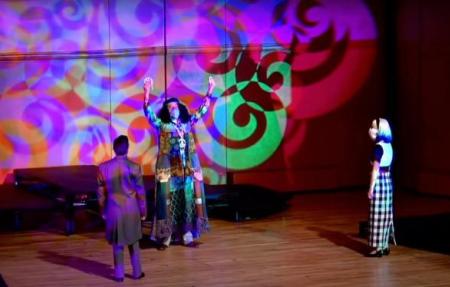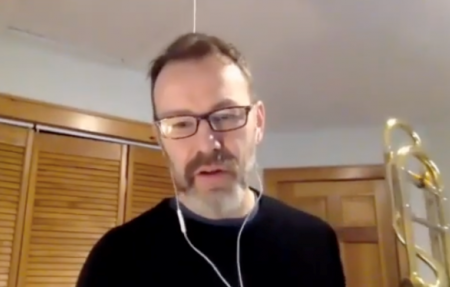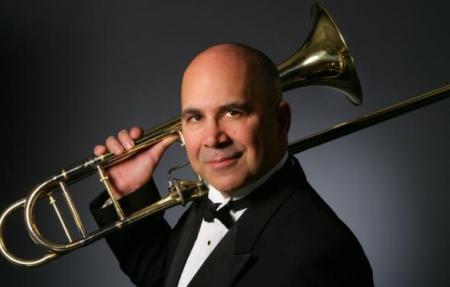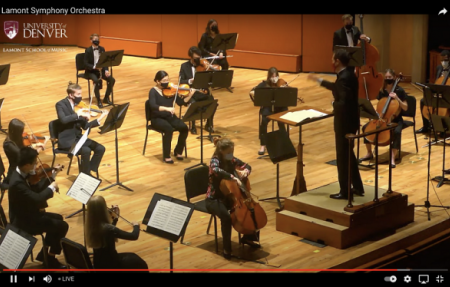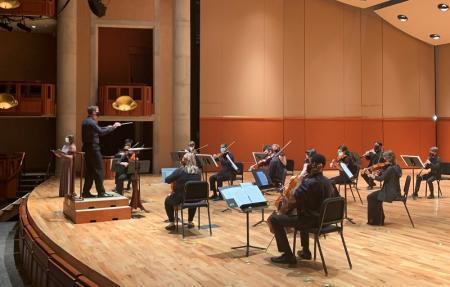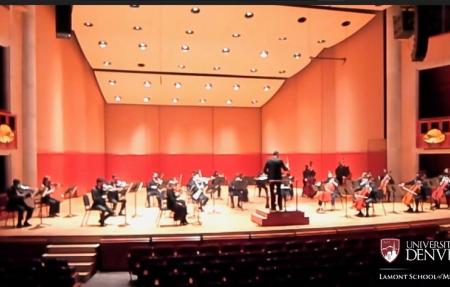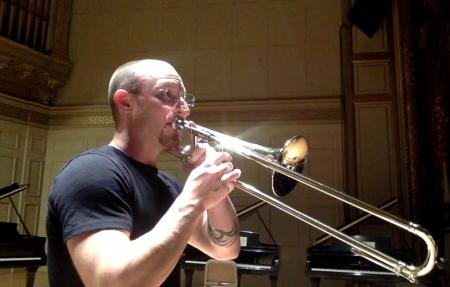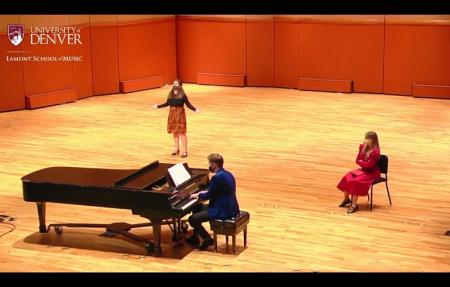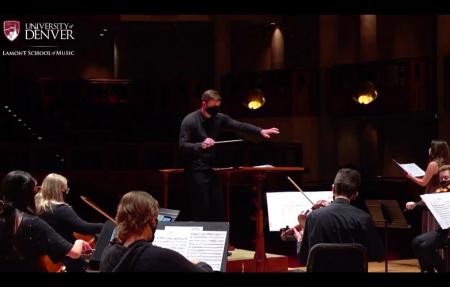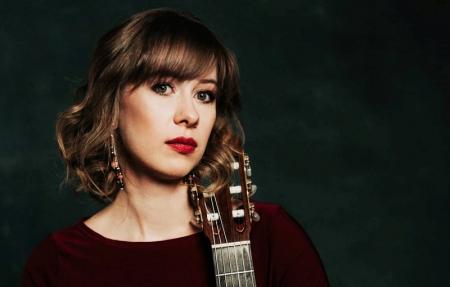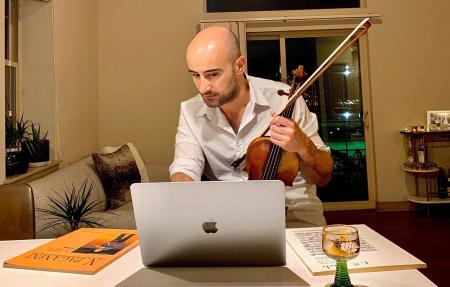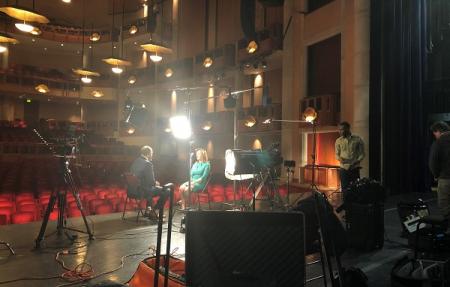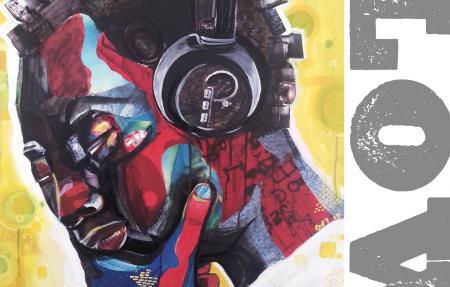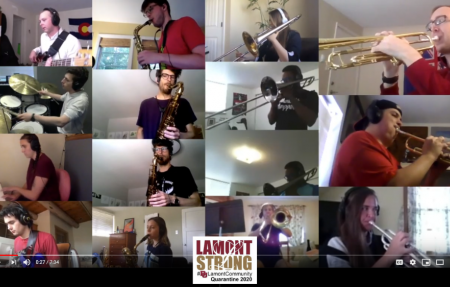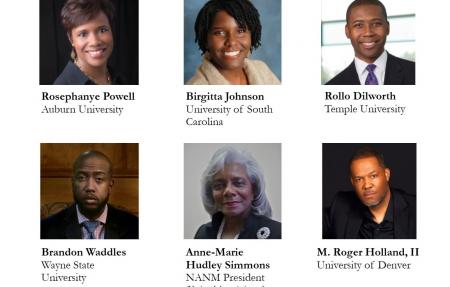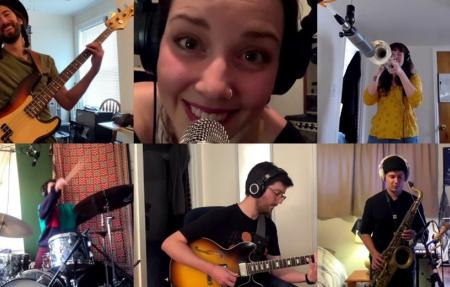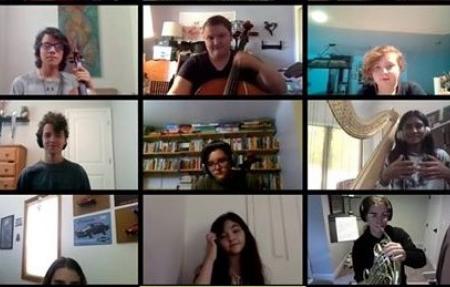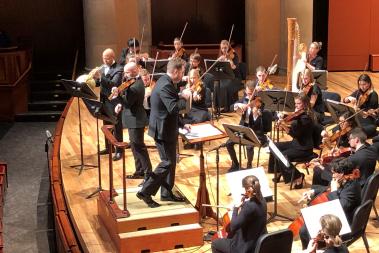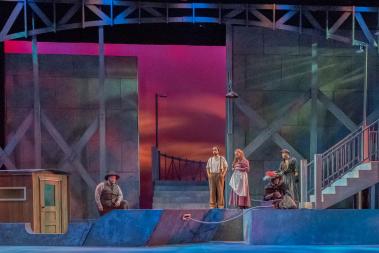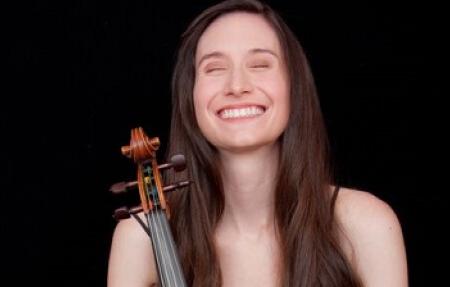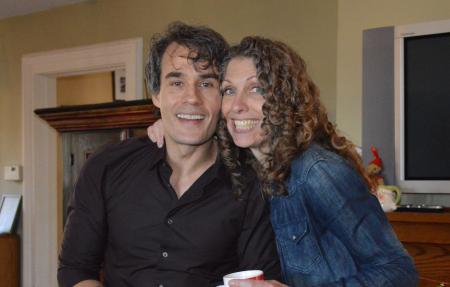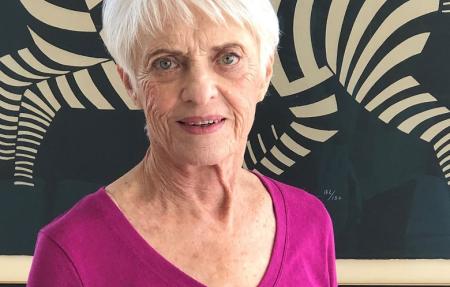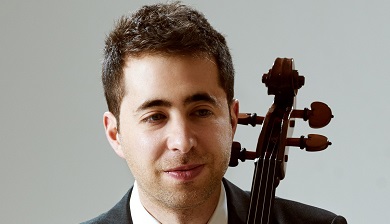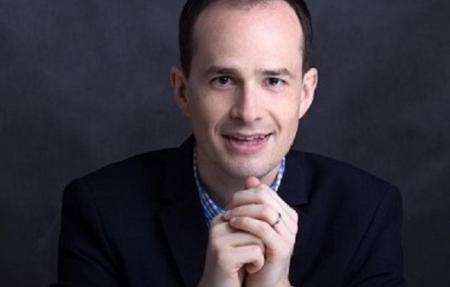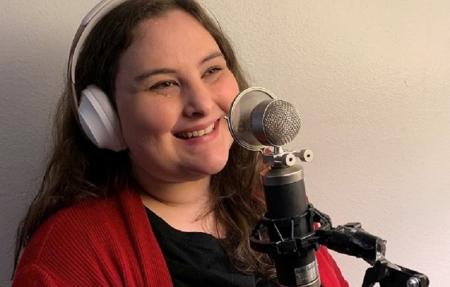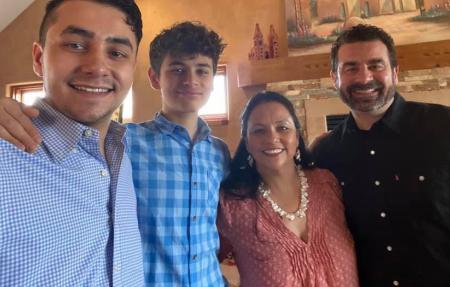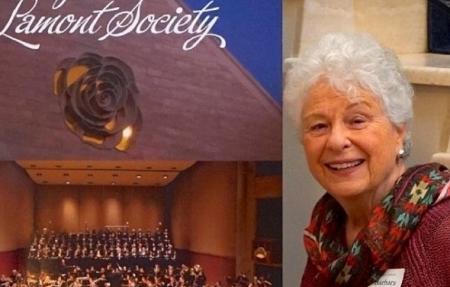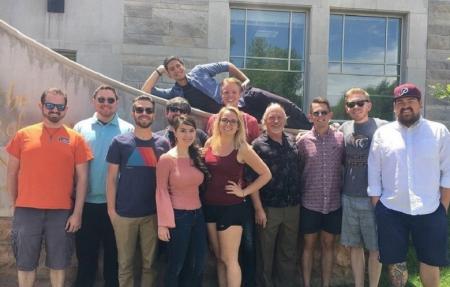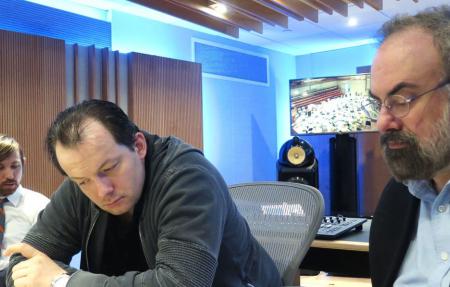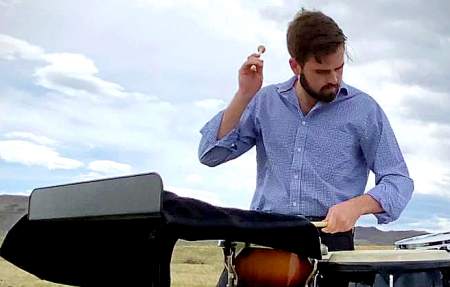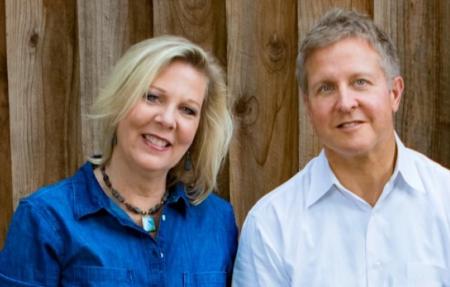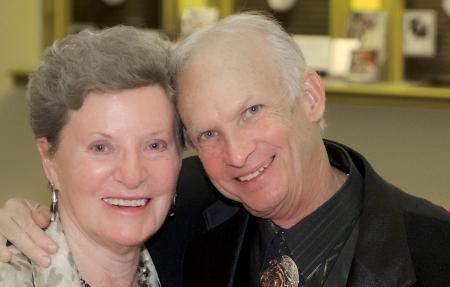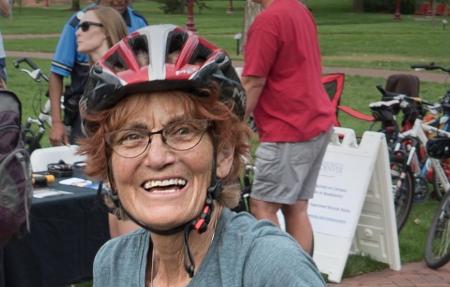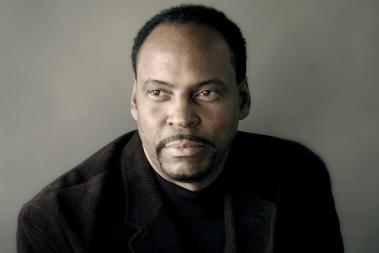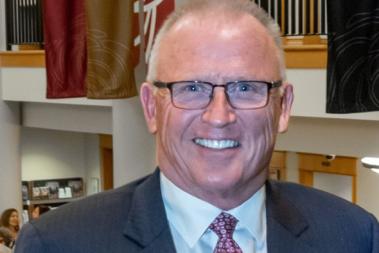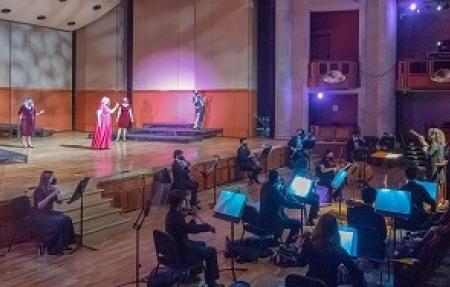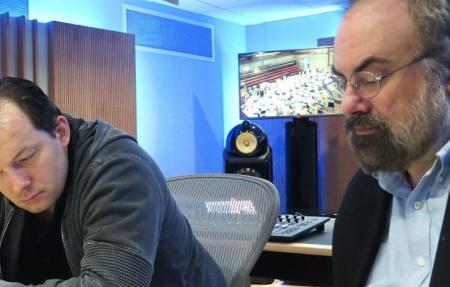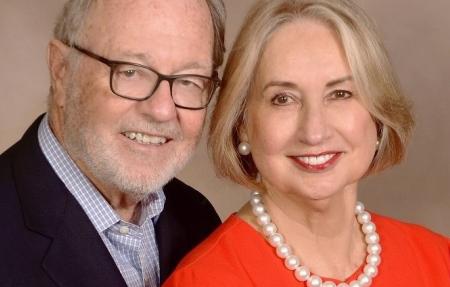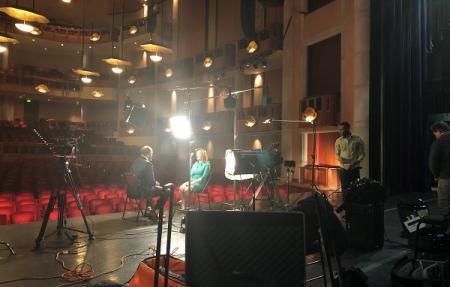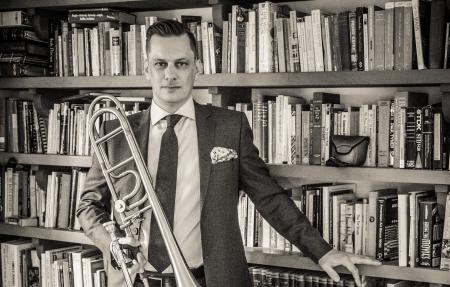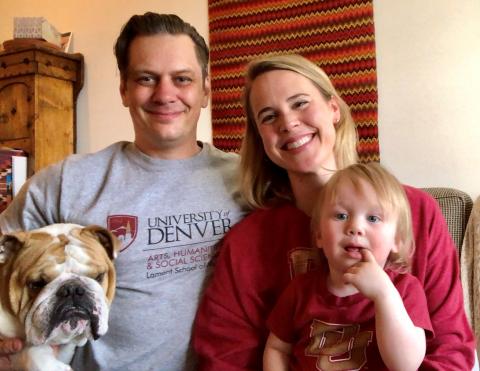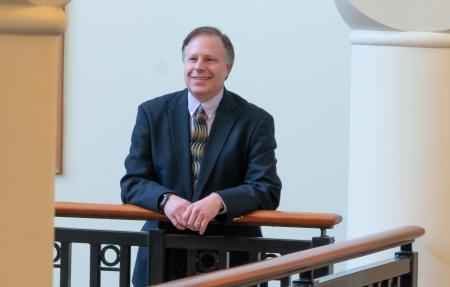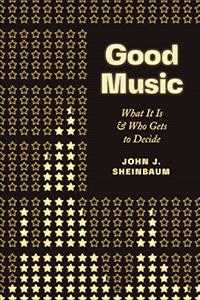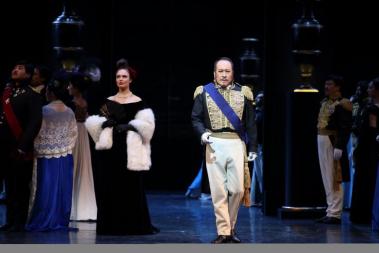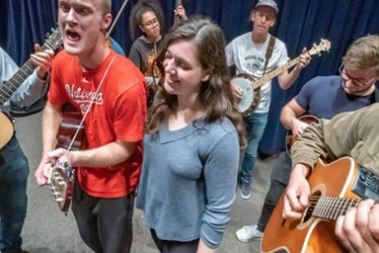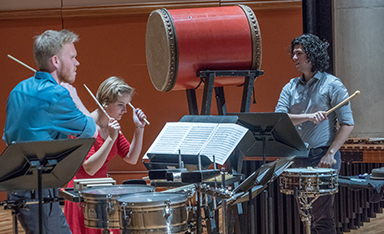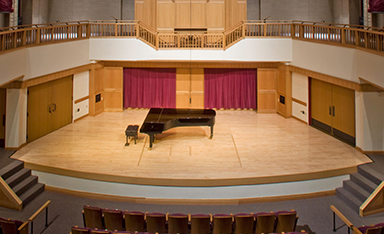Lamont Lyrics Archives
Prior Photos, Profiles & Stories from the DU Lamont School of Music Official Online Newsletter
For more information about Lamont Lyrics or high resolution press photos, please contact Angela Mitchell, Manager of Marketing & Communications, at angela.r.mitchell@du.edu.
-
Profile Archive: Winter 2022
Profiles from Winter 2022 Lamont Lyrics
Introducing a rising opera star, an award-winning student, proud parents from Mexico, a couple with a history of support, an American Prize-winning conductor & a miracle-working staff member.
Alumni Profile
Teresa CastilloSoprano Teresa Castillo has graced the stage of Carnegie Hall multiple times, including in the debut of a work by Lamont alumnus Kevin Padworski and with renowned conductor and composer John Rutter.
by Ian Wisekal
Teresa's Website
February 1, 2022Zooming in from her tidy apartment at the northern tip of Manhattan, Teresa Castillo met me with a warm smile. A native of Aurora, Colorado, the soprano and Lamont grad (MM ’13) has had a long and eventful journey since her days on the Front Range.
At Lamont, Castillo sang in the school’s productions of Marriage of Figaro and Hansel and Gretel, also traveling with the cast of Figaro to sing an encore performance in Yakima, Washington. That trip was a highlight of her Lamont days, recalls Castillo: “There’s a beautiful theater there, and the area itself was beautiful; we even met the mayor!” The pre- and post-show experiences, although routine, were just as meaningful. Castillo and the rest of the cast helped to build the sets and afterwards dismantle everything, followed by the traditional pizza party. “You’re all exhausted, especially when the opera is over,” she laughed, “but it’s so nice to hang out with everyone after all the singing and all the manual labor.”
When she first moved to New York in 2015, like many young people, Castillo lived with roommates and worked odd jobs before being accepted to prestigious young artist programs. She sang in the Bel Canto program at Caramoor (later called Teatro Nuovo), the Merola Opera Program at San Francisco Opera, where she reunited with fellow Lamont alumna Sarah Cambidge, and the Herndon Emerging Artist Program at Virginia Opera. “I got paid to sing; it was very exciting,” said Castillo of these programs.
Since then, the soprano has graced the stage of Carnegie Hall multiple times, including in the debut of a work by Lamont alumnus Kevin Padworski and with renowned conductor and composer John Rutter. Castillo was due to rejoin Rutter at Carnegie as a soloist in the composer’s Gloria, and she was slated to sing for Pope Francis at the Vatican as a result of her prize in the Altamuro/Caruso International Voice Competition. Due to the pandemic, both performances were cancelled.
Thinking back to early 2020, running endlessly between musical and non-musical jobs, Castillo needed a break. “There was some relief when the pandemic hit,” she admitted. With so much more time on her hands, Castillo got back into bicycling, became more adventurous in her cooking, and even taught herself to juggle.
What’s more, without so much external pressure, added Castillo, “it rekindled my love for singing.” She practiced basics and fundamentals every day and started to make videos as a creative outlet amid the monotony of lockdown. One of these videos, her first ever on the TikTok platform, included the famous, fiendish aria sung by the Queen of the Night in Mozart’s The Magic Flute. To her surprise, the video garnered over half a million views and led to her being cast as the cover for the role in in the 2021 production of Flute by the Lyric Opera of Chicago, one of the country’s premier houses.
Since performances have restarted, aside from her work in Chicago, Castillo has taught masterclasses and performed in New York, Miami and Idaho. Among other engagements this year, she will be returning to Teatro Nuovo in La Sonnambula and performing twice with Opera San Jose, singing Frasquita in Carmen and Maria in West Side Story.
Wherever she goes, Castillo will be bringing her buoyant personality, can-do attitude, and the encouragement and support of the Lamont community.
Student Profile
Tommy DainkoSenior percussionist Tommy Dainko is the unassuming type. One would never know that last spring he received Lamont’s highest student honor, the Presser Undergraduate Scholar Award, which recognizes outstanding musical and academic merit.
by Ian Wisekal
February 1, 2022Senior percussionist Tommy Dainko is the unassuming type. Talking with him for any length of time, one would never know that last spring he received Lamont’s highest student honor, the Presser Undergraduate Scholar Award, which recognizes outstanding musical and academic merit and comes with a $4000 prize.
Dainko, a Colorado native, started piano lessons at age seven. When band began in fifth grade, he gravitated towards percussion because of its keyboard instruments, but “it didn’t feel serious,” Dainko said, until his sophomore year of high school. When he began percussion lessons his senior year, it just so happened that his teacher, Mike van Wirt (now a member of the Colorado Symphony) was a Lamont alumnus.
“No other kids were serious about music in my school,” said Dainko, so he asked his band director and private teacher about college programs. When Dainko applied to Lamont, percussion faculty John Kinzie wrote to him personally and offered what ended up being the first of several complimentary lessons. After his successful audition, that level of individual attention helped convince the young percussionist to enroll.
Among Dainko’s standout experiences at Lamont was rehearsing and performing with the Modern Music Ensemble last year, a year when many schools only offered virtual learning. “I had friends who were not sitting in an ensemble for months,” he said. By contrast, trombone professor Richard Harris encouraged Dainko’s group to do more and go further; they commissioned a piece from student composer Alex Niederberger and prepared enough repertoire to give a full-length recital. “It was so great to get to do all that music with close friends.”
Another highlight was the open-door policy maintained by many faculty, especially musicology professors Gillian Gower, Petra Frazier, and professor emerita Antonia Banducci. “They were always so helpful if I ever reached out,” Dainko told me, “and were always willing to set time aside for me to chat one on one.” Due in part to this mentorship, musicology now figures strongly in his graduate school plans.
In addition to his passion for chamber music, Dainko intends to delve into the field of ethnomusicology, looking specifically at the interaction between folk music traditions and art music, among other genres. (One current project involves an analysis of folk music employed as a narrative device in video games.) The Presser award funds have helped to serve both of those aims, paying for new mallets, a new laptop, and sheet music.
At a time of year when most music students have yet to begin their college auditions, Dainko has already been accepted to the Royal Conservatoire of Scotland and the Royal Northern College of Music in Manchester, England. The schools attracted him for two principal reasons: their percussion and musicology programs are renowned, and Dainko’s mother is English, giving him dual citizenship with the UK.
As for his career goals, Dainko is sanguine. “It would be really cool,” he said, to eventually become part of the gaming world. Or to go into musicology. Or to play percussion professionally. Or a combination of those things. One thing is certain: no matter what Dainko decides to dedicate himself to, Lamont’s doors will always be open to him.
Parent Profile
Héctor Jardón Tapia and Laura Lucero RodriguezStudent conductor Héctor Jardón's parents come from Toluca, Mexico, about an hour west of Mexico City, where both grew up. Music runs in the family: His father Héctor Jardón Tapia is a singer and guitarist, and his mother Laura Lucero Rodriguez's father was a musician who sang and played the violin.
by Ian Wisekal
February 1, 2022From the moment we sat down together, it was clear how proud Héctor Jardón Tapia and Laura Lucero Rodriguez are of their son, conductor Héctor Jardón Rodriguez (AD ’22, MM ’20). In our conversation, conducted mostly in Spanish, both mother and father became visibly emotional when reflecting on their son’s success.
The family comes from Toluca, Mexico, about an hour west of Mexico City, where both parents grew up. Music runs in the family: Héctor Sr. is a singer and guitarist, and Laura’s father was a musician who sang and played the violin. “Music is a blessing to me,” she said.
With relatives in Denver, Colorado had been a longtime vacation destination for the family. They shared fond memories of skiing, hiking and photographing the Rockies. Héctor Jr. was excited to relocate to Denver, with his parents’ approval, to pursue his undergraduate degree at Colorado Christian University. (The conductor joked: “I liked snow… before I moved to Denver.”)
It was at CCU, where he was studying saxophone, that the young Héctor first took a conducting class. “I just fell in love with it,” he remembered, and he proved to be a natural. “As parents, it is very special that our son could become a conductor,” his father said. Laura added, “We’ve always wanted to support his dreams.”
For the proud parents, watching Jardón Rodriguez’s Artist Diploma conducting recital was especially meaningful. He led the Lamont Symphony Orchestra in an ambitious program of works by Aaron Copland, Antonín Dvořák and Silvestre Revueltas, a Mexican composer. The elder Héctor loved hearing the piece by Revueltas, which was a collection of extracts from the composer’s score to the experimental 1936 film Redes (English title: The Wave). “It’s a difficult, complicated piece,” Héctor Sr. commented. “I’ve seen fragments of the film; the music is really the important part.”
Jardón Tapia and Lucero Rodriguez had to make many adjustments during the pandemic, especially with the cancellation of so many concerts, parties and other events that help to pay a musician’s bills. They were happy that their son’s studies at DU continued uninterrupted, and, at the time of our interview, many musical engagements were starting to return in Mexico. Said Héctor Sr., “None of us have gotten sick, and that’s what really matters.”
Laura looked over at her son and said, “It’s thanks to God and his blessings that we are here,” not just health-wise, but at DU specifically. “It takes a lot of ability and talent to do what he does.” Héctor Sr. added, “We are very fortunate that the university considered Héctor for this opportunity. It’s a great honor.”
Lamont, likewise, was honored to host the visitors, and grateful to have Héctor Jardón Rodriguez as a prominent, baton-wielding member of its community.
Donor Profile
Jan & Gary FriedlandDenver natives and childhood sweethearts, Jan & Gary Friedland have supported Lamont for decades and even were there to help create our donor group – The Lamont Society.
by Ian Wisekal
February 1, 2022One day in 1982, Jan Friedland received a phone call from Marion Gottesfeld, who asked her to serve on a board that eventually became the Lamont Society Council, the governing board of the Lamont Society. “I couldn’t say no to Marion,” Jan said, chuckling both nervously and nostalgically about a person who was “a force.” Little did Jan know that acquiescing to Marion would lead to a commitment that continues to this day, something that brings her great joy.
As one of six original members, Jan is one of its longest serving members of the Lamont Society Council. The group first met at Colorado Women’s College, and one of their original goals was to bring friends along to Lamont concerts, which in the 1980s included multiple venues – a far cry from our current home in the magnificent Newman Center for the Performing Arts. She also helped found “Lamont School for a Day,” the brainchild of Barbara Goldburg and the precursor to Day at Lamont, a day when Lamont Society donors attend classes, rehearsals, lessons, special presentations, and a concert over lunch in Joy Burns Plaza. Jan eventually was elected President of the Lamont Society in 2017 and served brilliantly.
Jan and Gary Friedland are Denver natives. They were childhood sweethearts and have been married for 65 years. Gary was an internist and had a long, illustrious career at Rose Medical Center and St. Joseph’s hospital. At St. Joe’s, as it is known, he served for some time as president of the medical staff. In “retirement” he taught there for eighteen years, pursuing an interest in hospice while serving on the board and the Ethics Committee. In fact, he started the Ethics Committee at St. Joe’s in the 1980s.
Both Jan and Gary come from musical families. “There was music in my house all the time,” said Jan. Her mother, who had perfect pitch, played the violin and her father the cello; Gary’s father played the violin, and his mother played piano. Jan herself chose piano, Gary the clarinet.
Lamont coming into their lives was special for both of them. To this day, Jan and Gary enjoy going to concerts. Students have played in their home at parties. They have sponsored students and have “enjoyed going to the rehearsals and listening to students interact with their professors at Day at Lamont.” They have endowed a fund honoring Jan’s mother that purchases orchestral scores. Jan has recruited new members for the Lamont Society Council, including the president who succeeded her. Both Jan and Gary smile when thinking of the longstanding, wonderful friendships they have developed through Lamont.
Jan describes Lamont as “such a happy place.” “I was brought up with music,” Jan said, “and being part of Lamont was just perfect for me. I have been on a lot of boards and a lot of committees, but Lamont’s was always the happiest. It was just a pleasure.”
It has been a pleasure for us, Jan and Gary, to have you as part of Lamont!
Faculty Profile
Catherine SailerA Lamont Chorale and journalism student's admiration for 2021 American Prize-winner Catherine Sailer led to a PBS Colorado Voices story and video.
Story & video courtesy of DU graduate Grace Ganz and Rocky Mountain PBS.by Grace Ganz
February 1, 2022Editor's note: This Colorado Voices story was produced by journalism and vocal jazz student, and Lamont Chorale member Grace Ganz as part of an ongoing partnership between Rocky Mountain PBS’ Colorado Voices series and the University of Denver.
Catherine Sailer recently won the The American Prize, Dale Warland Award in Choral Conducting, 2021 (college/university chorus division).
Watch the Video
Visit the American Prize WebsiteIn the Lamont School of Music’s Gates Concert Hall, a hoard of masked faces sing “alleluia.” Although there may not be much to praise a year into a global pandemic, the University of Denver’s Lamont Chorale still finds joy in singing 10 feet apart under the fearless leadership of Catherine Sailer. As one of the few high-caliber female conductors in the country, Sailer knows how to command a choir and a career.
A Call to Conduct
A self-described “full-on Coloradan,” Sailer grew up among the Rocky Mountains and has served as the Director of Choral Studies at her alma mater for the past 20 years. Though she studied solo piano in undergraduate and master’s programs at DU, she felt called by the niche field of conducting since the days she led her high school’s marching band.
Though many outside of the musical world may not understand the bold gestures and baton waving characteristic of conducting, the field is one of the most male-dominated and competitive forms of musical employment – according to a report by NPR, “less than 10% of orchestras are directed by women,” and the number drops below 6% in Europe. However, Sailer’s success has always been driven by her innate passion for music.
“[With] conducting, I feel like I get to sing every voice and I get to play every instrument,” said Sailer, emphatically gesturing as if she was at the podium. “It’s never boring. There is so much music and just so much variety and so many different types of ensembles...I really love it.”
Sailer discovered her love of choral conducting after attending a Lamont Chorale concert during her undergraduate years at DU. Weeks later, she was singing and conducting in the same choir.
“[I] also just really got addicted to the immediacy of that relationship between singers and the conductor that it’s just palpable,” said Sailer. “...There is no barrier between the singers and the conductor and I feel like we just connect in a way that is so meaningful and so vibrant.”
Sailer’s Legacy
In 1999, Sailer moved to Chicago to pursue a doctorate in conducting from Northwestern University, only to hear about a job opening for a choral director at Lamont right after graduating from the program. Taking the opportunity to return to the Mile High City, Sailer grew the choral program to new heights: under her direction, the Lamont Chorale won first and second place awards in prestigious competitions like The American Prize for Choral Performance and Bärenreiter’s Mårten Jansson Choral Competition. She also started the Lamont Women’s Chorus only a year after beginning her position at DU, a group that continues to flourish today.
Throughout her time as Lamont’s choral director, Sailer has deepened her roots in the Denver music scene and around the world. She currently serves as the associate conductor of the Colorado Ballet, conductor of the Evans Choir, and has made appearances conducting world-renowned ensembles from the New York Philharmonic to the Beijing Symphony. Sailer has also collaborated with popular artists Chance the Rapper and Josh Groban.
Success in a Male-Dominated Field
However, Sailer’s work is not all about prizes and titles – rather, the sheer passion and drive she holds for making music is more than enough to inspire her and her students. This commitment to her craft is also a direct product of growing up in Colorado; as a child, Sailer often attended the Colorado Symphony where trailblazing female conductor Marin Alsop stood on the podium. Seeing Alsop commanding an orchestra served as the unconsciously empowering example that Sailer needed to become a strong conductor herself. Later in her professional career, Sailer was able to work with Alsop at the Cabrillo Festival of Contemporary Music in Santa Cruz, CA..
“I’m so grateful for that example that she had because [conducting as a female] didn’t feel so strange,” said Sailer. “You don’t have to have a zillion people out there that do exactly what you do. Sometimes just seeing one person doing something is a real encouragement.”
After Sailer began her career, she realized she would often be the only female conductor in the room. Though she laughs when she claims that all advanced female conductors can count each other by name, she has experienced significant hardship and discrimination in her field. However, Sailer views this as a reminder to be a genuine example for others.
“I think there’s always this constant balance of trying to be authentically who you are, because you can’t be a good music maker if you're not being authentic,” said Sailer. “This is who I am, and I’m going to be authentic about that. I’m not going to try to pretend I’m a man.”
Staying with Her Students and Her Roots
Anyone who spends 20 minutes observing one of Sailer’s choral rehearsals can palpably feel this authenticity and the love her students have for her. In between run-throughs of modern choral pieces and Renaissance chamber music, Sailer playfully banters with her students and ensures she is giving eager students the opportunity to conduct and receive podium time.
While Sailer has traveled around the world and worked with musical legends, she will always return to her program at Lamont, the exact place that first inspired her to be a choral conductor. Perhaps Sailer summed it up perfectly on the other end of a Zoom interview, sparkling with bliss: “There’s nothing like those singers...those are my people.”
Staff Profile
Maddy KuhlEver wonder how Lamont was able to produce 230 events in one year in the middle of a pandemic? The leader behind that miracle was Maddy Kuhl, Lamont’s Concert Production and Facilities Manager.
by keith Ward
February 1, 2022Ever wonder how Lamont was able to produce 230 events in one year in the middle of a pandemic? The leader behind that miracle was Maddy Kuhl, Lamont’s Concert Production and Facilities Manager. Kuhl started producing concerts at Lamont in spring 2019. She has had a tremendous impact on the success of our concerts and our transition to streaming. Because so much of producing a concert requires that a producer and crew are not seen, it’s a joy to bring her out of the shadows here in Lyrics!
Kuhl has been in music business since she could walk. Both her parents are musicians, and early in her life she became a “roadie,” helping set up for shows around Denver and beyond. By high school, music was one of her only outlets; she knew she wanted to stay involved by producing concerts. At Metropolitan State and CU Denver, she developed her own degree in audio production between the two schools, one that spoke to the way she wanted to shape her career. Through her studies, she gained what she called “a broad perspective of what production, events, and music really look like and how they impact the greater community.” She was hooked.
After an internship at Swallow Hill Music, Kuhl did contract work along with a fulltime job at the Denver Center. The most impactful and inspirational qualities of her work came down to helping people connect with music. “There are so many different styles,” she said. “All are an expression of culture, time, and place. It brings a richness to our world.”
Producing shows can feel like a high-wire act. “It is the most moment-to-moment type of work that isn’t in a medical field that I can think of,” said Kuhl. “You have to be present through the whole lead-up to the concert. If you’re doing things right, the actual performance is the point where you usually are the most relaxed.” One can never relax completely, though, since “one minute can be the difference between an amazing event and a big disaster.” It’s intense but highly rewarding work.
Executing a successful show has its own satisfaction. Kuhl described “doing the invisible work” in a production that can contribute to something feeling magical, “where the audience has that suspension of disbelief, or it has that moment of feeling as if they are in a completely different world than the one they were in before walking through the door to the venue.”
At Lamont, Kuhl enjoys working with students, faculty, performers, volunteers, and patrons. “I see students develop as performers throughout their studies,” she said. “The questions they ask become more mature and thorough, making it clear they have a better understanding of an entire production instead of just their part. I really enjoy getting to work with a crew, seeing how they develop, and directly mentoring them. Production is a completely different part of the industry where music majors could work. It is just as accessible a career path as any.”
Production management, hospitality, lights, sound, video, front of house, marketing, ticketing: all these elements contribute to a successful concert, something whose execution is seamless to the point where all you remember is the experience of a wonderful night of music. At Lamont, we can thank Kuhl and our entire staff for their invisible contributions toward such memorable moments.
-
News Story Archive: Winter 2022
Dr. Robert Yekovich, BM 1978, MA 1980, Receives the 2022 Lamont Distinguished Alumni Award
Composer, educator and university administrator Dr. Robert Yekovich has been named recipient of the 2022 Lamont School of Music Distinguished Alumni Award. He joins two other graduates who have received the school’s highest alumni honor: international opera star Hao Jiang Tian and Star Wars music editor Robert Wolff.
The Lamont Distinguished Alumni Award
The new Distinguished Alumni Award was created exclusively for Lamont by prestigious Bennett Awards. The gold plated, cast pewter, Lamont "L" stands six inches tall and sits on a wood block chosen to match the oak used in the Newman Center. The award will be presented to each of our three distinguished graduates when the pandemic and their schedules allow them to visit the DU campus.
DU Maestro Draws Inspiration From Father
Lawrence Golan’s father, Joseph, did not push him into music. But when Golan waves his conductor’s baton, there’s no doubt he’s channeling the spirit of the man who served as a Chicago Symphony Orchestra violinist for nearly five decades.
Read Story
Note: Lawrence Golan has been named the University of Denver’s 2021 Distinguished Scholar. -
Photo Archive: Winter 2022
"Take a Look at Us" photos from Winter 2022 Lamont Lyrics
Recent Alumni - Taking Their Place as Lamont's Encore Around the World
Kevin Keith Percussionist & Vocalist
Kevin has been named a Nashville "Rising Star" composing, arranging, recording, touring and performing in clubs.
Read Nashville Voyager "Rising Star" Story
Guillermo Gomez Ramasasa Mortimer Clarinetist
Guillermo (left in photo) lives in London and performed with Southbank Sinfonia.Visit the Southbank Sinfonia Website
Georgios Alevrofas Guitarist
Georgios teaches classical, electric and acoustic guitar in Copenhagen and is a member of the Danish rock band SKARNET.
Lauren Spaulding Violist
Lauren recently joined the award-winning Thalea String Quartet, based in Maryland.
Visit The Thalea String Quartet Website
Carrie McCune Trumpeter & Kathak Dancer
Carrie plays trumpet in the Denver band "Mama Magnolia," just recording their first album, and is manager and a featured Kathak dancer with the Leela Dance Collective.
Visit the Mama Magnolia Website
Visit the Leela Dance Collective Website
Sam Oatts Trumpeter
Sam is the trumpet soloist in the opening theme and incidental music (variations on the Abblasen Fanfare) for CBS Mornings with Gayle King.
Max Oppeltz-Carroz Cellist
Max won a Cincinnati Symphony Orchestra / Cincinnati College-Conservatory of Music Diversity Fellowship and is performing with the CSO.
Visit the Cincinnati Symphony Orchestra Website
-
Photo Archive: Winter 2020 - Fall 2021
"Take a Look at Us" photos from Fall 2021 Lamont Lyrics
Drawing from around the world, over the last three years Lamont has added to its star-studded performance faculty.
From Berlin & the World of Opera
Heidi Melton, sopranoDramatic soprano Heidi Melton has been called "the Wagnerian voice we have been waiting for since Flagstad and Nilsson." (La Presse), with a voice that is "big, gleaming and tonally resplendent" (San Francisco Chronicle). She has performed with the Metropolitan Opera, San Francisco Opera, Bayreuth Festival, Oper Frankfurt, Badisches Staatstheater, Deutsche Oper Berlin and the Canadian Opera Company. Heidi joined Lamont in 2021.
From the World of Symphony Orchestras
Courtney Hershey Bress, harpCourtney Hershey Bress joined the Colorado Symphony as Principal Harp in 2001. Before coming to Denver, Ms. Bress enjoyed a wide and varied freelance career, including engagements with the Singapore Symphony Orchestra and the Chicago Symphony Orchestra. She has served as Acting Principal of the Baltimore Symphony Orchestra and was Principal Harp with the United States Army Field Band in Washington, D.C. Courtney joined Lamont in 2021.
From the UK & the Worlds of Opera & Broadway
Richard Harris, tromboneA native of Worcestershire, England, trombonist Richard Harris recently performed on the GRAMMY award-winning album Twelve Little Spells with Esperanza Spalding, appeared on the OSCAR-wining soundtrack Joker, released a new recording of the Eric Richards Trombone Quartet Concerto and has performed on Broadway, at The Metropolitan Opera and at Radio City Music Hall. Richard joined Lamont in 2020.
From the World of Composition
Sean Friar, composer & pianistSean Friar's first musical experiences were in rock and blues piano improvisation. While his focus shifted toward classical, his compositions have always kept in touch with the energy and communicative directness of those musical roots. His compositions have been called “powerfully engaging and incredibly fun” (I Care if You Listen) and “refreshingly new and solidly mature" (Slate Magazine). Sean joined Lamont in 2020.
From the Worlds of Horn Performance & New Music
David Byrd-Marrow, hornAtlanta native David Byrd-Marrow is the solo hornist of the International Contemporary Ensemble (ICE), a new music collective that performs internationally and serves as ensemble-in-residence at Lincoln Center’s Mostly Mozart Festival. Working with a uniquely wide range of performers, he has premiered works by Matthias Pintscher, Arthur Kampela, George Lewis, Tyshawn Sorey, Anna Thorvaldsdottir, Du Yun, Marcos Balter, Wang Lu, Kate Soper, Miguel Zenón, and Chick Corea. David joined Lamont in 2019.
From Iran & the World of Opera
Sahar Nouri, Music Director, Lamont Opera TheatreIranian conductor and pianist, Sahar Nouri, returns to Opera Colorado in 2021-22 for a sixth season serving as the company’s chorus master, assistant conductor and principal coach. Previously, Ms. Nouri has been a member of the music staff at San Francisco Opera, Houston Grand Opera, Dallas Opera, Opera North Carolina, Opera Parallèle, Glimmerglass Festival, Utah Opera, Opera in the Heights, Aspen Opera Theatre, Opera Steamboat and Merola Opera. She is also on the music staff at the San Francisco Conservatory of Music. Sahar joined Lamont in 2019.
From Russia and the World of Violin Performance
Igor Pikayzen, violinAward-winning Russian-American violinist Igor Pikayzen is confidently establishing himself as one of the most prodigious and in-demand soloists of his generation. Praised on four continents by critics and audiences alike for his “astounding technical ability” and a “majestically lush tone”, Igor Pikayzen “surely is at the forefront of a major musical career” (Moscow Times). Igor joined Lamont in 2019.
Triumphing Over the Pandemic
Lamont Opera Theatre
Mozart's "The Magic Flute"On three nights, Lamont Opera Theatre student singers, LSO musicians, director Matthew Plenk, conductor Sahar Nouri and the Lamont production team streamed a staged and costumed concert production of Mozart’s comic opera The Magic Flute. They overcame safety protocols that had them singing in masks while 12 feet apart.
Master Classes
Met Orchestra MusiciansPrincipal artists of MET Orchestra Musicians visited the DU campus virtually to teach master classes. While waiting to return to the pit at Lincoln Center, these outstanding musicians imparted their knowledge and performance experience to Lamont students on four Sundays in February.
Photo: Demian Austin, principal trombone
Visit Met Orchestra Musicians Website
Artist in Residence
Joe Alessi, tromboneJoe Alessi, principal trombone with the New York Philharmonic, masked up and came to campus for a residency performing with the Lamont Wind Ensemble, Trombone Choir and the jazz faculty ensemble Phröntrange.
Streaming
230 Streamed Concerts, Master Classes & EventsLamont's streaming production team built a streaming capability in days and then went on to stream 230 concerts, master classes and events. Screenshot of Lamont graduate cellist Kelcey Howell performing with the Lamont Symphony Orchestra.
"Take a Look at Us" photos from Winter 2021 Lamont Lyrics
A yearbook of streamed performances where performers soared in spite of strict pandemic protocols.
Fall Concert Season
Concerts, Master Classes & Convocations were Streamed LiveLamont events were streamed while following strict pandemic safety limits of number of performers on stage and time spent in the room. Safety protocols also included mandatory masks and performer distancing.2019.
Live Streamed Performance
Lamont Symphony Orchestra & Lamont Wind EnsembleMusic Director Lawrence Golan conducted the Lamont Symphony Orchestra in a performance as Crimson and Gold string orchestras. They performed works by Peter Boyer, Gustav Mahler, George Walker, Piotr I. Tchaikovsky and a premiere of Threnody by Christopher Marshall.
The Lamont Wind Ensemble, conducted by Joseph Martin, gave two performances highlighted by a performance of Aaron Copland's Lincoln Portrait, narrated by M. Roger Holland.Master Class
Master Class — Toby Oft, tromboneToby Oft, principal trombonist of the Boston Symphony Orchestra, visited the campus virtually to teach a master class.
Master classes and symposiums were also presented by composers Andy Green and John Aylward, and percussionist Matthew Strauss.
Streamed Performance
Lamont Opera Theatre — "An Evening of Italian Opera Scenes"Lamont Opera Theatre singers perform scenes from the great Italian operas: Cosi fan tutti, L'Italiana in Algeri. Don Giovanni and more. The performance was conducted bu Sahar Nouri, accompanied by pianist Cody Guy Garrison and directed by Matthew Plenk.
Zoom Convocations
Balkan Bump & The FlobotsBalkan Bump & The Flobots, Andy Rok Guerrero & Jamie Lauri gave Lamont students a close-up look at young touring music professionals.
Streamed Performances
Student RecitalsStudents performed their degree recitals throughout the season.
Photo: Conducting graduate student Drew Ritchie conducts his graduate recital.
Streamed Event
2020 Denver Guitar Festival & CompetitionThis year's Denver Guitar Festival & Competition was held virtually with guitarists competing from around the world.
1st Prize: Katarzyna Smolarek, Salzburg, Austria
2nd Prize: Bogdan Mihailescu, Gaillard, France
3rd Prize: Ana Maria Lordache, Tucson, AZ
4th Prize: Chinnawat Themkumkwun, Bangkok, Thailand
"Take a Look at Us" photos from Fall 2020 Lamont Lyrics
A yearbook of challenges formed by our response to the pandemic and a call for inclusion and diversity.
Pandemic Response
Faculty & Students Rise to Challenge of Pivoting to Virtual ClassesWhen the campus closed last spring faculty, students and staff met and exceeded the challenges caused by moving to virtual classes, lessons, performances and master classes. Photo of and by Igor Pikayzen.
Inclusion & Diversity
The Spirituals Project on the CBS Evening NewsSpirituals Project director M. Roger Holland and longtime choir member Alice Rasberry were interviewed for a national story by Janet Shamlian on the CBS Evening News. Photo by Chris Wiger
Inclusion & Diversity
Flow: The Rhythmic Voice in Rap Music by Mitchell OhrinerLamont music theory faculty member Mitchell Ohriner has published a new book addressing flow, the rhythm of the rapping voice. Originating in dance parties in the South Bronx in the late 1970s, hip hop and rap music have become a dominant style of popular music in the United States and a force for activism all over the world. Photo — Detail of the cover.
Pandemic Response
Steve Wiest & the Lamont Jazz Orchestra Record VirtuallySteve Wiest and the Lamont Jazz Orchestra worked with student recording engineer Colton Sparks to produce a pair of virtual recordings. Other studios and ensembles also contributed recordings during the spring. Photo — Zoom screen shot.
Inclusion & Diversity
Choral Diversity — Equity in Sound & PracticeLamont and GIA Publishing co-sponsored a national webinar narrated by Lamont's M. Roger Holland. He was joined by five other choral directors and scholars in a very important conversation about issues of diversity, equity and inclusion in choral music and education.
Pandemic Response
#DULamont
CommunitySince our concert and recital hall stages were dark, we presented at-home performances by Lamont students, faculty and graduates on social media. Photo — Zoom screen shot
Pandemic Response
A Virtual Lamont Summer Academy Was a FirstThe two-week program held in late June and early July moved online serving pre-college musicians in all four time zones and Mexico. Students participated in a variety of music making including a very innovative approach to chamber music over the internet. Photo — Zoom screen shot
"Take a Look at Us" Photos from Winter 2020 Lamont Lyrics
November 2019
Lamont Opera Theatre GalaNew Lamont Opera Theatre music director Sahar Nouri conducts the Lamont Symphony Orchestra in the Lamont Opera Theatre Gala. Photo by Wayne Armstrong
October 2019
New Faculty Members Perform with Lamont Symphony OrchestraNew Lamont faculty members hornist David Byrd-Marrow and violinist Igor Pikayzen perform with the Lamont Symphony Orchestra and guest conductor Brett Mitchell, music director of the Colorado Symphony. Photo by Wayne Armstrong
September 2019
Opera Star Kathleen Battle Performs with the Spirituals Project ChoirLegendary Metropolitan Opera soprano Kathleen Battle presented a powerful program of songs inspired by the Underground Railroad with Lamont's Spirituals Project Choir, directed by M. Roger Holland, II. Photo by Wayne Armstrong
April 2019
Lamont Opera Theatre performs Puccini's "Il trittico"Matthew Plenk directed Lamont Opera Theatre's new production of Puccini's Il trittico with sets, costumes and lighting designed by DU Theatre. Photo by Wayne Armstrong
February 2019
Lamont Chorale Tours New MexicoThe Lamont Chorale and conductor Catherine Sailer toured New Mexico with a special performance in the The Cathedral Basilica of Saint Francis of Assisi in Santa Fe. Photo by Chris Wiger
September 2018
Lamont Jazz Orchestra Performs at Prestigious Monterey Jazz FestivalDirector Steve Wiest and the Lamont Jazz Orchestra won the Next Generation Jazz Festival and were featured performers at the 61st Monterey Jazz Festival. Photo by Stacy Dymalski
-
Profile Archive: Winter 2020 - Fall 2022
Profiles from Fall 2021 Lamont Lyrics
Introducing a rising opera star, an award-winning student, proud parents from Mexico, a couple with a history of support, an American Prize-winning conductor & a miracle-working staff member.
Alumni Profile
George ArvidsonGeorge Arvidson, BM 2014 in voice performance, has journeyed from Lamont's Oklahoma to London's West End, to filming his first major film role in Bulgaria.
by Ian Wisekal
August 1, 2021Photo: Courtesy of Millennium Films through the actor.
Photo: As CPT Chris Cordova in The OutpostGeorge Arvidson (BM ’14) was initiated early into theater. As he was learning to speak, he also learned, thanks to a cassette tape recording of Joseph and the Amazing Technicolor Dream Coat, to sing the colors of Joseph’s coat. By the time Arvidson was three, “far, far too young,” the Denver native allowed, his mother took him to see Phantom of the Opera at the Buell Theater. Not only did the young fan sit through the whole show, he became, in his words, “just obsessed with it.” After that, each week Arvidson, whose mother is English, would alternate playing Christina and the Phantom at home. He reflected, “My mum did it to herself, really, poor lady.”
Now a veteran of regional, touring and West End theatrical productions, the London-based Lamont alumnus credits his voice professor, Catherine Kasch, with his vocal training. “She is an incredible teacher,” Arvidson related, and Kasch’s legacy is very present. “I still think about her teaching all the time,” he said, “and I still use her [vocal] warm-ups. She is a massive part of what made my technique; she built my voice up.”
Arvidson’s career took an unexpected turn in 2019 when, in between auditions for Les Misérables and Phantom, he landed a part in a feature film about the war in Afghanistan called The Outpost. Uncertain whether he should abandon his Les Mis audition, for which he had already reached the finals, Arvidson took the advice of his agent and booked the film. “It was the most incredible experience I’ve ever had. It completely blew my mind,” he said.
Filming in Bulgaria over the course of three months, Arvidson left with more friends, more creative stimulation, and, on his first movie set, a deep appreciation for the dedication and care he saw among the crew, director, and other actors. “Everyone had a stake in wanting the film to be really good,” Arvidson recalled, “and the crew take care of you. They pick you up from your house, they feed you, they even offer to drive you 100 yards from place to place on set.”
In the end, Arvidson ended up booking Les Mis, too, and was on tour with the show when COVID-19 struck. “What defines you as an actor isn’t just what you do when you work, but what you do when you don’t,” he said. Not only did Arvidson earn diplomas in personal training and yoga, he also landed a role with a show called The World Goes Round, one of only a few live productions in the UK in the summer of 2020.
The Lamont grad counts himself as very lucky and is excited to get back into the theater this fall, rejoining a 14-month tour with Les Mis in the UK and Ireland. Thanks to the deep theater culture of the British, there are many large venues across the country that, according to Arvidson, “are even bigger than the West End theaters. You’re actually getting more people seeing the show [on tour] than you would doing it in London.” But if traveling to the UK for one of those performances is a bit out of reach, you can catch Arvidson’s work in The Outpost, which is available streaming on Netflix
.
Student Profile
Christina EbersohlChristina Ebersohl describes herself as a “nontraditional student”: she is married, has stepchildren, is an Army veteran, is blind and plays the viola.
by Ian Wisekal
August 1, 2021Christina Ebersohl describes herself as a “nontraditional student”: she is married, has stepchildren, is an Army veteran, is blind, and to top it off, she plays the viola. “The viola isn’t standard,” she said, “and I don’t fit in the box, either. We both just hang out outside the box!”
Ebersohl graduated from Lamont in June 2021 with her master’s in viola performance and is staying on this year to complete a Certificate in Performance. Although she had always been musically active, playing piano, tuba, flute, and other instruments, her path to the viola was also nonstandard: while most string players begin learning their instruments before the age of ten, Ebersohl began her viola study well into adulthood. When she was training to be an Army linguist and began to lose her vision due to complications from a nervous disorder called neuromyelitis optica, she heard a movement from Heinrich Biber’s Rosary Sonatas for solo viola. “The sound was so soulful, so warm,” Ebersohl recalled. “I couldn’t believe that such a sound could come out of that instrument.” A new path was decided.
For Ebersohl, forging new paths is something of a hobby. It was no surprise when the violist won the 2021 Frank Toth Memorial Award, a Lamont prize for extraordinary commitment to extracurricular activities. In addition to her varied musical exploits, the would-be linguist studied Japanese, Russian, French, Italian and Arabic; she is the first-ever blind Licensed Body Mapping Educator; she has developed and presented internationally a course on institutional accessibility; she is the editor of the Journal of the American Viola Society; and she is building a foundation to sponsor a classical music scholarship competition for students who have overcome disabilities.
Body Mapping, Ebersohl explained, is the use of intentional movement to prevent and eliminate performance injuries through efficient and dynamic movement. Ebersohl’s body awareness expanded when she lost her sight, and after she became a licensed instructor, she began offering free body-mapping sessions to struggling Lamont students, advertising in the Lamont Digest.
Being a student with accessibility challenges, Ebersohl was moved to write a paper for her Intro to Graduate Studies class called “Accessibility Is Not a Four-Letter Word” that offers suggestions to institutions to improve their offerings. She published the paper and has presented the course that grew out of it to organizations in the US, Canada and Australia. Ebersohl’s next presentation is to the National Music Library Association, a group of hundreds of librarians across the country.
Finding no existing music scholarship competition geared towards nontraditional or disabled students, and realizing that the vast majority are open only to very young musicians, Ebersohl hopes to fill the gap with her new foundation and competition. Some donations have already been set aside, and with collaborative help from Prof. Matthew Zalkind, she hopes to roll out the first competition in three to four years.
Among Ebersohl’s near-term ambitions are to give two recitals next year, one featuring music by the Italian viola pedagogue Marco Anzoletti, whose works are standard in his native country but virtually unknown in the US. The recital will also act as a fundraising event for the National Federation of the Blind Performing Arts Division. She intends, in addition to her accessibility advocacy work, to continue to push for the viola’s place on the solo stage, in part by recording the composer’s caprices for solo viola. “I don’t like to sit still,” she said in an understatement that elicited a laugh. Ebersohl continued, “In the end, you can have the most natural talent in the world and do nothing with it. It’s the hard work and dedication and commitment that will create success in anyone’s life.”
Parent Profile
Jeff & Wendy PucilloJeff & Wendy Pucillo described their daughter Ruby as "a little performer coming out of the womb." Now Ruby is an accomplished Lamont jazz vocalist.
by Ian Wisekal
August 1, 2021Jeff and Wendy Pucillo, of Hastings-on-Hudson, north of New York City, reached me by phone on their vacation in Chicago. It was a coincidental but fitting halfway point between Jeff’s stomping grounds on Staten Island and Wendy’s hometown in Northern California. Their pride of their daughter, Ruby, a junior double-majoring in vocal jazz performance and English with a possible minor in French, was obvious, and stories about her childhood came fast and lucid.
“She was a little performer coming out of the womb,” Wendy said of Ruby, and the Pucillos were keen to support her creative development. Showing an early interest in ballet, Ruby started dance lessons when she was three and wrote her own ballet at five. Wendy’s love of jazz struck another early chord: by the time Ruby was four years old, her parents recounted, she could identify all the jazz greats whose records they played in the background at dinner parties.
Wendy came to jazz through her grandfather, who loved sharing with her his collection of big-band records and inspired her to dig deeper into the genre. When it was her turn to “reign over the record player,” according to Jeff, Wendy played lots of jazz and classical records in the house, like Clifford Brown with Strings. “Ruby grew up in a musical household because of Wendy,” he said.
Jeff, as a boy, did not embrace music at first – “I hated guitar lessons; I hated my teacher,” he remembered – but came around after receiving an electric guitar for his twelfth birthday. Eventually he formed a band and, early in his career, found work as an assistant audio engineer for Greene St. Recording, recording and mixing records by hip-hop artists like Nas and Afrika Bambaataa and jazz legends like Roy Ayers.
The moment Ruby decided she wanted to pursue jazz, the Pucillos told me, was when she first heard Charles Mingus, specifically the tune “Fables of Faubus” from his seminal album Ah Um. Precocious socially, musically and academically, Ruby wanted to find a school in a vibrant city where she could study not only jazz, but also literary criticism and French at a high level. That was when DU and Lamont entered the conversation.
In the Pucillos’ Westchester County milieu, Ivy-League schools dominate the college search, they said. But none could provide a strong undergraduate program in music performance. After doing some research, the family flew to Denver and were wowed. “We loved the city,” Jeff explained, “and when Ruby saw Lamont, she said, ‘This is the real deal.’” Wendy described their conversations with faculty and staff: “Everyone at DU made us feel welcome, and they made Ruby really feel wanted.”
Joining the Lamont Society was an easy decision from the Pucillos’ point of view. “The faculty is incredible, the building is incredible,” Jeff said, “and the people who made the building had vision and were dreamers. I’m a dreamer.” He and Wendy have been very impressed with the students they have met, and they want to support the goal of attracting a more diverse student body. “I hope Ruby will be similarly inspired when her days at DU are over,” Jeff continued, “which will be too soon, in my opinion.”
The school’s streaming concerts were a lifeline during the past year for the Pucillos. “Those Lamont live-streams have helped us get through the pandemic,” Jeff confessed. “It was like a drink of cold water after walking through the desert.”
The Pucillos are excited for the future of DU and Lamont, and they will be able to view some of it personally even after Ruby graduates: their younger daughter, Hazel, after taking a gap year, will enroll at DU in the fall of 2022.
Donor Profile
Phyllis GoodmanThe new Lamont Society council president, Phyllis Goodman was musically inspired by her late husband, Neal, a physician by training with a passion for jazz piano.
by Ian Wisekal
August 1, 2021For Phyllis Goodman, Denver native and president of the Lamont Society Council, musical involvement started in the form of piano lessons. “I was pretty terrible,” she recounted with a laugh, “but it was a thing to do.” Later, it was Goodman’s late husband, Neal, who brought music into the home. A physician by training, jazz piano was his passion, and a love for music became contagious in the Goodman household.
Over a decade ago, Jan Friedland invited Goodman to join the Lamont Society. No stranger to volunteering and the arts, she happily accepted the invitation. “I enjoyed the people, I enjoyed the school,” she explained, “and of course I enjoyed the music.” Before becoming president, Goodman served in a number of positions on the Council, helping with event planning and recruitment efforts.
Curiosity is also a driving force behind Goodman’s involvement. Beyond the springtime Showcase Lamont gala, which she describes as “exceptional,” Goodman attends a variety of concerts throughout the year by students and faculty alike. She particularly treasures Day at Lamont: “It’s one of my most favorite experiences,” she said, being able to sit in on lessons to get a peek behind the scenes and glimpse the work that goes into those performances. Goodman tries to mix it up, attending different classes and ensemble rehearsals each year.
Not being able to attend in-person events was trying for Goodman, who likes to stay active. She exercised her curiosity in different ways, taking online classes in music, art and architecture through the Osher Lifelong Learning Institute (OLLI). She also got involved with a discussion group of eight other women, shifting meetings between outdoors with masks, Zoom, and, post-vaccinations, each other’s homes.
The new president has high hopes for the coming year. “Working with Keith Ward is just an amazing opportunity,” she said, citing his “wonderful ideas and know-how.” Goodman is looking to increase the activity of the Lamont Society: not just by attracting new members, but by encouraging more involvement from current members. Looking ahead to the fall, it will help, she predicts, to get people out to hear students and meet faculty in person.
Goodman, who has traveled to all seven continents including Antarctica, is now most excited to travel to the concert hall to hear live music again. “It will be so wonderful to get the school back open to audiences,” she said. And Lamont looks forward to having Goodman, and audience members old and new, back in its halls.
Faculty Profile
Matthew ZalkindAn internationally-recognized cellist, Matthew Zalkind has celebrated three recent milestones. He received tenure at DU, he bought his first house, and he got married.
by Ian Wisekal
August 1, 2021Since Matthew Zalkind’s last profile, written when he joined the Lamont faculty in 2015, the cellist has celebrated some milestones, three of which occurred in just the last 18 months: he received tenure at DU, he bought his first house, and he got married.
Zalkind’s wedding to fellow cellist and Lamont faculty member in chamber music, Alice Yoo, took place as scheduled on March 28, 2020, but without any of the planned hubbub or pizzazz. (Their reception remains, as yet, postponed.) Closing on the couple’s house, an easy commute from campus, luckily took place before the city went into lockdown. As for tenure, Zalkind is just happy that he gets to call Denver home for years to come.
Making music during the pandemic was, for the normally busy performer, revelatory. Zalkind recorded recitals from home and from Hamilton recital hall, and pivoted his hometown summer project, the Denver Chamber Music Festival (DCMF), to an online series in 2020. “Learning the tech side of our field,” such as recording and streaming, “are skills that will remain in our wheelhouse forever,” said Zalkind. Plus, there was lots of time to practice. “This was a break I didn’t know I needed,” the professor revealed. “I found a way to reinvent my approach to the instrument.”
Teaching during the past year, a trying experience for everyone, also had its unexpected highlights. The cello studio at Lamont grew to its biggest number yet, welcoming nine new cellists in the fall of 2020 alone, and made a sterling impression. “This is just the most wonderful group,” Zalkind beamed. “They were great citizens during COVID and really kept their musical standards high. While the world stopped, their work really continued.” With less time spent at gigs and outside rehearsals, and plenty of shared hardships to commiserate about, he said, “Alice and I felt closer to the students than we’ve ever felt. We were all going through it together.”
On the home front, Zalkind and Yoo found a new passion: gardening in their first-ever yard. In addition to flowers, the couple found success planting tomatoes, zucchini and herbs. “Alice is definitely the master, and I’m the assistant,” Zalkind admitted. They also explored hiking opportunities closer to home, favoring Chautauqua Park in Boulder and Roxborough State Park in Littleton.
Now that concerts have returned, Zalkind said, “It feels like the light switch just turned on. We went from a drought to a flood.” In addition to his concerts with the DCMF, the again-busy performer and teacher returns this summer to the Olympic Music Festival in Washington, the Green Mountain Chamber Music Festival in Vermont, the Boulder Cello Festival, and performs several concerts with the Colorado Cello Quartet.
In addition to planning DCMF’s 2022 season, Zalkind looks forward to seeing his students again in the fall, hopefully under more usual-looking circumstances. “My performing career has been extremely varied over the years,” he reflected. “But while I enjoy having a dual career in performance and pedagogy, the most gratifying part of my life will always remain teaching.”
Profiles from Winter 2021 Lamont Lyrics
Introducing an alumnus conductor now a rising star in Europe, a graduate student singer building a podcast future, New Mexico parents bringing a warm glow to Lamont, a donor who spreads her joy across Denver and a professor whose students are legion.
Alumni Profile
Kornel ThomasKornel Thomas, AD 2014 in conducting, grew up in Budapest. As the Assistant Conductor of the Savaria Symphony in Hungary, he is one of the rising young stars among orchestra conductors in Europe.
Photo by Zsofi Raffayby Ian Wisekal
February 1, 2021Kornel Thomas (AD ’14), a Budapest-based conductor who also grew up there, came to music first by way of composition. In eighth grade, one of his teachers offered to let Thomas use Finale, a notation program, on his computer instead of going to recess. Thomas was hooked and studied composition through his high-school years, but as conducting took center stage in college, he had to keep his own music waiting in the wings.
In Denver, where Thomas was Assistant Director of the Lamont Symphony Orchestra and the Denver Philharmonic, Music Director of the Nebula Ensemble, and a Teaching Artist with El Sistema Colorado, he made another important connection: meeting his future wife, clarinetist Aileen Razey (MM ’15). Thomas and Razey, who is an assistant professor at Kutztown University in Pennsylvania and an interim lecturer at Ithaca College, have racked up plenty of frequent-flier miles visiting each other as often as they can.
Since leaving Lamont, Thomas has been conducting throughout the US and Europe, most frequently as the Assistant Conductor of the Savaria Symphony in Hungary. Thomas, who has held that post since 2017, is charged with leading some subscription concerts and the bulk of the orchestra’s educational programming, which makes up nearly half of its more than 100 annual performances. In a fortuitous and unusual turn, he is now being considered for the orchestra’s Music Director position in a process that will run through 2022.
Thomas, whose father is from the States, says his favorite concert with Savaria was an all-American program: music from Bernstein’s On the Town, Gershwin’s An American in Paris, and more. It was a full house, Thomas recounted: “It was really a new sensation to hear only American music. Musicians were telling me that this was a once-in-a-lifetime experience for them.” The icing on the cake was that Razey, who happened to be visiting at the time, got to join the clarinet section for the performance.
When the COVID-19 pandemic struck last year and Thomas saw his conducting engagements canceled, he booked the only flights he could to Pennsylvania: a one-way, 36-hour journey. “It was a long trip, but it was joyous,” Thomas said, beaming, “to be able to see Aileen for four whole months.” It also gave him the necessary time to revisit his original musical flame, which had lain dormant for 15 years: composition.
Getting started again was equal parts desire and necessity. “Basically,” explained Thomas, “I had a wife who said, ‘I want a piece for clarinet.’ ” He wrote one, and more new works followed; Thomas began applying for grants and entering competitions. As luck would have it, some of these bore fruit. The Palace of the Arts Budapest (MUPA) Composition Competition declared him a winner in two categories, chamber music and chamber orchestra, and Razey is slated to premiere his clarinet piece at the International Clarinet Association conference in Fort Worth this summer.
Looking ahead, Thomas is excited about his upcoming debut with the Hungarian State Opera, conducting Lully’s Le Bourgeois Gentilhomme, and to hearing his works premiered in Texas and Hungary. In the meantime, he’s getting back to a nearly daily routine: running in the hills of Buda (across the Danube from Pest), which he has known intimately since high school. “The hills carry memories with them,” Thomas reflected, “of me as a teenager; me as a young adult. It’s my place of meditation.” Now he will have even more music to meditate on: the works of past masters he is conducting, and the music of his own fresh voice.
Student Profile
Lilli Bailey DuranGraduate Student Lilli Bailey Duran created The Rose Room student podcast and has ambitious plans for a national college podcast network.
Angela Mitchell interviewed Lilli for Lyrics.Parent Profile
Carmen Flórez-Mansi and Tom MansiCarmen Flórez-Mansi and Tom Mansi bring a warm glow to Lamont and son Thomasluke from Santa Fe, New Mexico, where they contribute their talents to the Symphony, the Cathedral Basilica and St. Michael's High School.
by Ian Wisekal
February 1, 2021Carmen Flórez-Mansi and Tom Mansi, parents to senior voice major Thomasluke Flórez-Mansi, radiate a warmth and energy that, in our Zoom meeting, was complemented by the glow of the afternoon sun on their faces. Their working lives center around the Cathedral Basilica of St. Francis of Assisi in Santa Fe, NM, Tom its Director of Finance and Carmen its Director of Music.
The Cathedral Basilica and its choirs have brought the family together not only in Santa Fe, but far beyond. Tom and Carmen sang with members of their Pontifical Chorus in Carnegie Hall and with the Sistine Chapel Choir, for Pope Francis, in Rome. Back home in Santa Fe, Thomasluke, a member of the children’s choir since age four, sang for the king and queen of Spain when the Cathedral hosted their visit in 2009.
At home, Carmen and Tom encouraged all their children’s interests—they also have a younger son, Estevan—whether they be music, sports, animals or art. “We just watch and see what blooms from that,” Carmen said. When Thomasluke was preparing to audition for the children’s chorus in Santa Fe Opera’s production of La Bohème, his mother remembers thinking, “Wow, there’s a voice there!” Despite her professional training, Carmen took care to respect the role of Thomasluke’s voice teachers and not interfere in his practice. “But if he was doing something at the church, doing something for me?” she laughed, “I was all over it!” Tom oversaw the kids’ education more generally: “I helped with the work ethic and discipline; the balance between schoolwork and music,” he said.
The family feels a special connection to Lamont. In addition to Thomasluke, who attended the Lamont Summer Academy for two summers before enrolling as an undergraduate, three of Carmen’s former students have attended the Summer Academy and two are currently voice majors. “We had a welcoming experience from day one,” Carmen remembered. In addition to the support received from performance faculty, academic faculty and admissions staff have also had a positive influence. “It’s a beautiful place; a warm place to grow as an artist,” she said.
While the Flórez-Mansis have been avid attendees of Lamont concerts ever since Thomasluke’s days at the Summer Academy, they have also managed to bring Lamont to Santa Fe. Catherine Sailer, the director of the Lamont Chorale, “has been a huge influence on Thomasluke; she’s phenomenal,” said Carmen. Since the Cathedral Basilica, with its reverberant acoustic, regularly hosts choirs from all over the world, Carmen issued a standing invitation for the Chorale, which Sailer accepted in 2019. During the Santa Fe leg of their tour, the Lamont Chorale performed twice at the Cathedral and conducted a master class at St. Michael’s High School, where Carmen teaches.
Besides the Cathedral Basilica, the other spot that brings the Flórez-Mansis together is the kitchen. Grinning, Tom said, “In addition to being a music family, we all love to cook.” “Tom is an amazing cook,” Carmen replied. Especially in the summer of 2020, when the family was cooped up at home, they often gathered to cook their dinners together, be it a traditional New Mexican favorite, like carne adovada-stuffed sopaipillas, or fresh bread made by Thomasluke.
“That was a silver lining,” offered Carmen of the pandemic, “spending all day, three meals a day, with my favorite guys.” Another silver lining? Three weeks before New Mexico issued a stay-at-home order, the family had moved into a new home on 11 acres with a large garden, chickens, dogs, cats; even a goat. Although travel was restricted, the Flórez-Mansis had plenty to occupy their days. “We love the privacy and freedom of being out in the country,” said Carmen. She and Tom smiled at each other. “Oh, and,” Tom added, “we made our own wine!”
Donor Profile
Barbara GoldburgA long-time Lamont Society donor and former council president, Barbara Goldburg spreads her joy and support across the Denver non-profit community.
by Ian Wisekal
February 1, 2021For someone who is “not a musician,” Barbara Goldburg has led a remarkably musical life. In addition to her work with the Lamont Society since 1983, for which she served two years as president, the Denver native played the piano in her youth and now focuses on the guitar, which she has been studying for over 30 years.
It was Marion Gottesfeld, the former DU trustee and Goldburg family friend, who first called upon Barbara and Jan Friedland to help reinvent the support group for Lamont. At the time, Goldburg was volunteering for Rose Medical, Kempe and Arapahoe Mental Health Centers, writing and presenting programs on mental health to K–8 students. Gottesfeld was “a dynamo…the kind of person you didn’t say ‘no’ to,” Goldburg remembered, and her suggestion proved perceptive: Goldburg immediately took to Lamont.
“Lamont has the joyful component,” Goldburg said. When Joseph Docksey, then Lamont’s director, encouraged her to serve as president of what was known as Lamont Music Associates, she was honored. “I’m so appreciative of the work the professors do and the work the students do to become musicians,” she said. To showcase this day-to-day work—not just the polished, stage-lit performances—Goldburg instituted what is now called Day at Lamont. This annual event, which gives Lamont Society donors the opportunity to sit in on classes, rehearsals and lessons, has become the most popular donor event each year. “It’s what I’m most proud of,” Goldburg revealed.
Another innovation was to open the doors of many Lamont Society events (lectures, faculty performances and the like) to donors at all levels, greatly increasing participation and involvement. To Goldburg, the change was not only philosophical but pragmatic: “I still think it’s the best deal in the city,” she said. “Lamont is a great gift to this community.”
Over the years, Goldburg has gotten to know and follow the careers of many Lamont students. One such relationship started with a recital: when Julian Bohorquez, a clarinet alumnus, played his senior recital at Lamont, Goldburg was struck by his brilliant musicianship and warm demeanor. The two became friends, and when Julian went to Pittsburgh for graduate studies at Carnegie Mellon, Goldburg connected him with her daughter, Carol, who is an economics professor there. Bohorquez ended up living with Carol during the school year, and he stayed in touch with the Goldburg family. Barbara was thrilled to attend Julian’s marriage to Lamont alumna Katie Bloise in 2019.
During the pandemic, Goldburg has remained active, albeit closer to home. Instead of “an awful lot of running around,” she has indulged in domestic pleasures, such as knitting and tending to her cat, Saul. And, like students across the globe, Goldburg has pivoted to remote learning. Her classes in Kabbalah, a discipline in Jewish mysticism that she has studied for 14 years, have moved to Zoom; her short story book club meets online; and she frequently attends virtual lectures from One Day University, an adult education program. When we spoke, Goldburg was excited about that day’s lecture, “The Meanings of Freedom,” from a professor at Rutgers University. “I’m busy; I’m never bored,” she assured me.
Like everyone in the Lamont community, Goldburg looks forward to returning to live events in the Newman Center. While she has enjoyed Lamont’s online offerings, she said, “Every time I walk into the wonderful building, it just makes me happy.” We look forward to welcoming back Goldburg, and all our wonderful supporters and patrons, just as soon as we can.
Faculty Profile
John KinzieAfter more than 20 years, Lamont's Director of Percussion Studies John Kinzie’s students are already legion. They talk about the impact he has made on their lives and careers.
by Chris Wiger
February 1, 2021William Ward was credited as saying, “The mediocre teacher tells. The good teacher explains. The superior teacher demonstrates. The great teacher inspires.”
As director of public relations at Lamont, I’ve reported on and sometimes accompanied our students to perform on tour or attend a national event. While reporting on our percussion students competing at PASIC (the Percussion Arts Society International Convention) where they won a number of top awards, I started hearing about their connection with and admiration for their Lamont professor, John Kinzie. I recently contacted a handful of John’s dedicated former and current students for this Lyrics profile.
First, a brief introduction: for more than 20 years as a Lamont professor, John Kinzie has taught percussion and timpani performance, percussion ensemble, master classes, and percussion pedagogy and repertoire. He has been principal percussionist since 1985 with the Colorado Symphony, where he often involves his students as substitutes and guest performers.
For Rachel Hargroder (MM 2008), Kinzie made a long-lasting, positive impression. “John taught me more than just how to be a professional musician. His tough love and no-nonsense teaching style also taught me how to better enjoy life, and in turn, become a better version of myself. I had many great experiences that stand out from my time in John’s studio, from playing with the Colorado Symphony, to laughing hysterically at something ridiculous that happened during a lesson.” Joey Glassman (BM 2014) commented, “John's impact on my musical life cannot be overstated. He completely changed how I approached each instrument, maximizing the beauty of each of their individual characters. That's great on its own, but what's most amazing about my time with John is that he mentored me all without imposition! He taught me HOW to express myself and how to maximize my ideas without supplanting them with his own; in other words, he guided me to becoming the deepest version of my musical self.”
Andrew Ferdig (BM 2016) owes much of who he is today to John Kinzie. “While his musical teachings will last in my playing throughout my career, it is John’s life lessons that have made a resounding impact on how I carry myself both on and off stage. John continuously teaches me the importance of professionalism, kindness, and (of course) humor. I could not have asked for a greater mentor.” “I had the pleasure of being John’s GTA through grad school,” says Neal Titus (MM 2017). “He supported me while researching non-traditional literature, encouraged me to listen to music differently, and challenged me to ask questions about everything. I learned not only how to perform music from John, but I also learned about relationship building with my peers. I most certainly would not be where I am today without the mentorship and guidance of John Kinzie.”
More recent graduate Kevin Keith (AD 2019) commented that Kinzie “helped me develop the courage and authority to take charge of my own development as a musician and a person. Our lessons always incorporated thorough discussions of confidence, decision-making and preparedness that have helped me in so many ways during performances, guest appearances and auditions. I am so grateful to have studied with John and am grateful to be able to call him my mentor and colleague!” Current Lamont student Justin Douté (AD) also showed his appreciation: “I am very grateful to him because he doesn’t just teach and organize the percussion department, he treats it as his family away from home. I feel very comfortable around him and the studio, which gives great inspiration for progressing as a musician. He has lifted me up when I most needed it. John is an unlimited optimism machine. He encourages you when you fail and pushes you further when you succeed.”
After more than 20 years, Kinzie’s students are already legion. Here's to inspiring and mentoring many more students for years to come.
Profiles from Fall 2020 Lamont Lyrics
Introducing a Lamont graduate making his mark in film, an award-winning student, parents who are Lamont Opera Theatre fans, one of our most deeply involved Lamont Society donors and a passionate just-retired member of our faculty.
Alumni Profile
Robert WolffRobert Wolff BM 1983 in oboe performance, was scoring editor for three of John Williams' Star Wars films and is currently editing a massive recording project for the Boston Symphony Orchestra.
Photo — Andrea Shea, WBUR. A playback session for Shostakovich: Symphony No.8, Symphony Hall, Boston, March 2016. (L to R) BSO recording engineer Nick Squire, Maestro Andris Nelsons and Robert.
by Robert Wolff
September 1, 2020When contacted to write an update to a previous profile, my first thought was, “So soon?” I was amazed that seven years had elapsed; in some ways the years had flown by, and in others it seemed a lifetime past.
I have been busy since the adventure of Lincoln. I still watch the Oscars yearly, since if John Williams writes a score, it usually gets nominated. I’ve worked on the Williams film scores to The Book Thief, Star Wars Episodes VII, VIII, and IX, The BFG, Dear Basketball, The Post, themes for Solo: A Star Wars Story and Gustavo Dudamel’s score to Libertador. I’ve worked on various album projects, including Hooten Plays Williams, the third disc of the “Williams/Spielberg Ultimate Collection,” and Anne-Sophie Mutter and John Williams’s Across the Stars.
A newer addition to my portfolio is editing for Andris Nelsons and the Boston Symphony Orchestra. I was asked to edit his inaugural concert recording as well as the PBS-TV production in 2015. Over the past five years we have worked on a complete cycle of Shostakovich symphonies, earning Grammy awards for Symphony No. 10 and the set of Symphonies 5, 8 and 9. Eight symphonies have been released, five more are in various stages of completion while two remain to be recorded. A set of Brahms symphonies was also recorded and readied for release in the span of six weeks in 2015. There is also a cycle of Strauss tone poems in progress and possibly a cycle of Mahler symphonies in the works.
Of course, in March 2020, the novel coronavirus brought everything to a screeching halt. I’ve been idle for 23 weeks as of mid-August. Over the past few weeks a few orchestras have slowly gone back to work in Europe and Asia, and there have been a few orchestra sessions here in Los Angeles. Many major orchestras have cancelled their fall concerts and the hope of resuming sometime early in 2021 dims with each passing day. The sessions here have been conducted under extremely tight protocols, limiting the number of musicians in the studio and in the control room to much smaller numbers than before the pandemic. The distancing required is an engineering challenge, requiring a change in thinking about mic placement and techniques. Since the majority of my work requires a lot of people in one place, the future is cloudy at best. Despite today’s dour environment, I still hold on to hope that we may one day make music as before.
The challenges facing today’s Lamont students are daunting. I humbly offer a few lessons I learned along the way:
1. Whatever your involvement with music is, remember that it is first and foremost an entertainment. It is a way of telling stories and connecting with others. Whatever you do, whether it be a project over Zoom or playing in a great concert hall, whether it be recording orchestras or jazz bands, whether or not the music you make is to your personal taste, remember it’s to be enjoyed. Many of the most beloved performances were made by people who were trying to entertain themselves.
2. Be patient and don’t say no to work or feel like something is beneath you. I didn’t leave Lamont and start working with world-class artists immediately—it took me 15 years of hard work before collaborating with “big-time” folks. I’ve done some crazy sessions but I didn’t really say “no” until I was asked to record an opera-singing dog after 32 years as an engineer. I also made the mistake of pooh-poohing MIDI because people were using it to imitate orchestras. Once I was in the film music business, I regretted that stance. I have also dabbled with a lot of other things: arranging, conducting, copying, trucking, radio, etc. The more things you know how to do, the better off you’ll be, and you’ll discover things about yourself that you didn’t realize before.
3. It’s never too early to be a professional. This was one of the first lessons I learned at Lamont. I was a freshman in the top ensembles and had to measure up to upperclassmen and graduate students. People will assume you know what you are doing. They will be more impressed with your talents if you do the little things like showing up on time, being prepared and getting along with the people you’re working with. Most people who possess tremendous talent are also pleasant to be around. Everyone wants and deserves to be treated with respect and humanity. The most famous person you know puts their pants on one leg at a time, same as you. Even Steven Spielberg drives his kids’ carpool..
Student Profile
James NickellJust entering his senior year, percussionist James Nickell already has a number of school-wide and international awards listed in his biography.
by In Wisekal
September 1,2020James Nickell, though he has not yet started his senior year, is already one of the most decorated members of the Lamont student body. He has won the school-wide Honors Chamber Competition; received a recital commendation for his exemplary junior recital, meticulously filmed and presented remotely in the spring of 2020; took first prize with his quartet at the International Percussion Ensemble Competition sponsored by PASIC, the worldwide percussion conference; and won a spot in PASIC’s All-Star Percussion Ensemble.
A native of Golden, CO, Nickell came to Lamont primarily to study with John Kinzie, percussion faculty and principal percussionist of the Colorado Symphony. Nickell remembers his audition well: after experiencing cold, clinical treatment from professors at other schools, he was immediately put at ease by Kinzie’s warmth and engagement. Kinzie took the time to get to know the young musician and shared that, for his studio, a person’s character is just as important as their playing. “That’s part of the reason why my experience with the percussion studio here has been so great,” Nickell offered. “Everyone is so collaborative and supportive…the small community has given me a lot of opportunities that I wouldn’t have otherwise had.”
One of Nickell’s collaborative efforts has already borne professional fruit and attracted attention off campus. Atlas Percussion, made up of the members of his Honors Chamber-winning quartet, has performed downtown at Dazzle Denver, at the Denver School of the Arts in an event hosted by Friends of Chamber Music, and at area schools for educational initiatives. They have also made several recordings and have begun a commissioning project to expand their repertoire.
Further afield, Nickell has attended several music festivals: the Vancouver Symphony Orchestral Institute and the University of British Columbia Chamber Orchestra Festival, both in Canada, and the Aspen Music Festival this summer (although its programming has moved online). These experiences were made possible thanks to the Joseph Docksey Fund, which gives Lamont students access to professional development resources.
It was in Vancouver, playing Shostakovich’s Fifth Symphony, when Nickell realized that his ultimate aim is to become an orchestral percussionist. “The experience was really powerful,” Nickell recalled. “Everybody has the same goal and everybody is really driven – everyone becomes one entity.”
To that end, Nickell plans to audition for several prestigious graduate schools scattered all over the country. He has already made a connection with a professor at the San Francisco Conservatory, Edward Stephan, who gave a guest master class at Lamont in January 2020 and with whom Nickell is studying this summer at Aspen.
Nickell takes a clear-eyed view of his prospects in the competitive world of professional auditions. “In order to get a job in an orchestra,” he explained, “I’m going to take every audition I can – on percussion and timpani – any job that comes up” in the U.S. and Canada. In the meantime, he plans to teach privately and to freelance, as he has already done with the Denver Philharmonic, the Boulder Symphony, and other groups in Colorado.
He also plans to continue taking advantage of Lamont’s resources. “I’ve been doing double lessons every week,” Nickell revealed, both with Kinzie and William Hill, the Colorado Symphony’s principal timpanist and a longtime member of the composition faculty at Lamont. “That has been the most beneficial thing for me: to study with guys who are really supportive and really committed to seeing me succeed.” With all of his external support and internal drive, the question is not whether Nickell will succeed, but how soon.
Parent Profile
Ann & Brian FitzgeraldAnn and Brian Fitzgerald's son Trey, a senior vocalist, has turned his parents into Lamont Opera Theatre fans.
by Keith Ward
September 1,2020Another special group within the Lamont community is students’ parents. They have invested time, effort and resources that are invaluable in preparing their sons and daughters for their next steps. We look forward to sharing some of their stories in each newsletter.
In this issue, we are delighted to feature Brian and Ann Fitzgerald from San Jose, California. Their son, Trey, is completing a bachelor of music degree in vocal performance. Ann, whom Brian credits with bringing arts into the family, hails from Minnesota, where she earned a degree in dance from the University of Minnesota. In addition to the never-ending work of being a stay-at-home mom, Ann has been active in their local school system, serving on the school board and leading parent participation activities. Brian, another Midwest native, grew up in Michigan. He attended Michigan State University, majoring in electrical engineering. Since the mid-1980s he has been in Silicon Valley, where he has built a career in high tech.
Brian and Ann live in a musically vibrant community, with opportunities in musical theater, orchestral and choral music beginning in the K-8 schools. Parents are deeply involved, from leading reading and math programs to organizing fundraisers. It was in this environment that Trey found his love of music: starting with musical theater in fifth grade, he eventually became active in after-school programs and in Starting Arts Dream Team, which develops young people’s skills in acting, singing and dancing. The strength of this and other programs have produced results that reach far beyond the community, with graduates now attending prestigious music schools across the country.
The Fitzgeralds travel from California “three or four times a year” to attend concerts at Lamont. They have enjoyed the Fall Opera Gala (featuring scenes from operas with full orchestral accompaniment), choral concerts, the spring opera productions and recitals. They have particularly fond memories of being in the audience for Mozart’s Marriage of Figaro and Puccini’s Il Trittico.
Ann and Brian have observed Lamont’s tight-knit, encouraging community firsthand and consider it something special. They are grateful for the support and opportunities for Trey that Lamont has provided. To Brian, this support was evident from the start when he and Trey met with now-retired opera director Ken Cox. It continues in work with current faculty and staff: Catherine Sailer (Director of Choral Activities), Matthew Plenk (Director of Opera and Trey’s voice teacher), Sahar Nouri (Music Director of Opera), Rachel Lim (Academic Advisor) and Chris Wiger (Director of Public Relations). Their efforts have resulted in Trey’s performing in Denver with professional ensembles, securing a church singing job, performing in an ensemble tour to Prague and studying at a summer program in Italy.
Brian shares that he and Ann “can’t wait to get back and get into Gates Hall to see a big show.” Once we return to live concerts, we look forward to welcoming them back!
Donor Profile
Jennifer HeglinA long-time Lamont Society donor, Jennifer Heglin takes special care of students by funding scholarships and student awards.
Photo — Jennifer Heglin with former Lamont director Joe Docksey. Wayne Armstrong, DU Photographer
by Ian Wisekal
September 1,2020If you have ever attended a Lamont concert, you are likely already familiar with Jennifer Heglin. You may have seen her smiling in her usual seat, overlooking the stage; you might remember her taking photographs; you may have heard her lovely English lilt as she congratulates musicians. In fact, Heglin’s involvement with Lamont is so deep that you might have noticed her at any given recital, concert or opera performance since before Lamont moved into its former home, in the Park Hill neighborhood, in 1986.
Heglin, originally from the east of England, was not always an avid concertgoer. When she was studying at a French secretarial school in London, it was a Swiss roommate who started dragging Heglin along to concerts. “She said, ‘This girl needs a bit of culture,’” Heglin remembered. When she emigrated to Canada, living first in Toronto, Heglin took advantage of the symphony’s free Sunday concerts and discovered the Toll Brothers Saturday broadcasts of the Metropolitan Opera. “That’s what turned me into an opera nut,” Heglin joked. “I haven’t missed one of those broadcasts in 60 years!”
In 1978, Jennifer married Clifford Heglin and relocated to Denver. By then a devotee of the arts, she recalled, “It was the year Boettcher [Concert Hall] opened.” She quickly joined several fundraising guilds, including those for the Colorado Symphony, Central City Opera and Denver Lyric Opera, and joined the Lamont Society – then called Lamont Music Associates – when the school moved into the Houston Fine Arts Center in Park Hill, now the site of Denver School of the Arts.
Heglin enjoyed getting to know many Lamont students, including Frank Toth, who died tragically young from pancreatic cancer. A gift in his name, the Frank Toth Memorial Award, has been funded by Heglin every year since then. She and her late husband, Cliff, became friends with former Lamont Director Joseph Docksey, and they donated to the Newman and All-Steinway funds during the construction of the Newman Center, which Docksey championed. Heglin was president of the Lamont Society when the building opened its doors in 2002.
In recent years, Heglin has funded many honors presented at the Lamont Awards Convocation each June: prizes for the winners of the Solo Honors and Honors Chamber Competitions, the outstanding student in composition, and the outstanding undergraduate and graduate students in academics, classical and jazz performance. Lamont now has an endowed scholarship named for Clifford Heglin, and Jennifer has made a matched bequest for a second one.
The feeling of loyalty to Lamont is strong in Heglin. “When I attend performances there,” she said, “they always seem so special. I know the people, and I’ve known them for a long time.” When Hao Jiang Tian, the recipient of Lamont’s inaugural Distinguished Alumni Award, began winning acclaim in the opera world, Heglin followed him across the U.S. and beyond, even flying to Nice to attend his European debut. She added, “I look on Lamont as my adopted family.”
Being such an active member of the Denver arts scene, one might wonder what interests Heglin outside the concert hall. When she is not supporting members of the music community, she dotes on a living community closer to home: her gardens. A lifelong enthusiast, Heglin began at age six by rescuing the violets that popped up in her family’s vegetable garden. Heglin described her current setup: “I’ve got two big balconies for flowers, two flower beds in front of the condo, a community garden where I grow flowers for cutting…and tomatoes.” She paused, letting the long, English “ah” vowel sink in. “To-MAY-toes, I should say.”
The next time you attend a Lamont concert, look out for Jennifer Heglin. Chances are excellent that, whatever the circumstances may be, whatever the format may be, she will be there, smiling, overlooking the stage.
Faculty Profile
Antonia BanducciAn avid bicyclist who recently retired from our faculty, Antonia Banducci has inspired students with her passion for music history and service to the Lamont community for 25 years.
Photo — Wayne Armstrong, DU Photographer
by Keith Ward
September 1,2020Antonia Banducci, Professor of Musicology, retired this June. In her 25 years at Lamont she guided generations of students and shared her unending passion for music. How does one sum up her rich career? This essay won’t do justice, but it will at least give a sense of this cherished member in the Lamont community.
Antonia taught a wide array of courses with opera having a very special place in her heart. When asked about a special moment during her career at Lamont, she said, without pause, that there isn’t one; there are many. So often those moments centered around students. Antonia engaged them in both the history of music and in the music itself. Her classes combined lecture, discussion, and performance, all of which brought the music alive. She challenged students to engage thoroughly in the music, to reflect upon it through research, discussion and writing. Her high standards made a difference in many students’ lives. Antonia enjoyed hearing from undergraduate students about how much they newly discovered in the music they studied in her classes in Medieval, Renaissance, Baroque, and Classical music. Her Baroque, Romantic and opera history seminar topics classes, as well as a strong focus on modern opera always provided for new discoveries. She also learned much from them, especially from the performers’ and composers’ points of view. “In both sets of classes, we were a community,” says Antonia. “We were engaged with each other. We were in it together.”
Lamont is a different place from when she came. Antonia was part of the generation of faculty and students who moved into the Newman Center in 2003 from what is now the Denver School of the Arts, eight miles from campus. In this inspiring new space of the Newman Center, Lamont took off. She proudly points out that the level of musicianship and professionalism has improved wonderfully over this time. She also praises our expansion into multiple musical styles that included steel drum, bluegrass, The Spirituals Project Choir, and ensembles celebrating multiple ethnicities, such as North Indian Kathak dance. She enjoyed watching our audiences grow as our footprint on the cultural life of the region expanded. During her career we became the destination we now are.
Students and service to her community are not all of Antonia’s story. She is a scholar of seventeenth-century music, especially opera, and has received accolades for her work on the music by Jean-Baptiste Lully (1632-1687). Her important discovery through painstaking archival research in Paris, France and elsewhere was that Lully built his operas around the performers he knew, and an important number of those star performers were women. “He may have been totally engaged in the drama, but the performers made the work. He knew who he was writing for.” She has garnered attention for her published scholarship, especially on Lully, and looks forward to completing her book on the composer’s music.
Scholarly work will not be her only activity during retirement. An avid cyclist, Antonia serves on Denver mayor’s Bicycle Advisory Committee, and she looks forward to activities with the Denver Bicycle Club. She also looks forward to time in her garden as well as concerts and other activities at DU. We will look forward to seeing her!
Thank you, Antonia. Thank you for your undying love of music. Thank you for making a difference in students’ lives. Thank you for being such a great colleague.
Profiles from Winter 2020 Lamont LyricsAlumni Profile
Sarah CambidgeDU Alumna Takes Center Stage at The Met
Sarah Cambidge (BM'11, MM '13) sings the role of the Lady in Waiting.
by Greg Glasgow
October 7, 2019It’s the dream of every aspiring opera singer: to appear on stage at the Metropolitan Opera in New York. For Sarah Cambidge (BM ’11, MM ’13), a graduate of the University of Denver’s Lamont School of Music, the dream came true in September, when she made her Met debut in the company’s production of Verdi’s “Macbeth.” Cambidge sings the role of the Lady in Waiting, appearing with such opera luminaries as soprano Anna Netrebko, baritone Željko Lučić and tenor Matthew Polenzani.
Cambidge has risen through the opera ranks since graduating from Lamont, performing on stages in the U.S. and Europe and in 2017 winning a coveted Adler Fellowship at San Francisco Opera. She will appear again at the Met in January, understudying the role of the Countess in “The Marriage of Figaro.”
The DU newsroom recently caught up with Cambidge to talk about her road to the Met and what it’s like to sing on that famous stage.
Q: In 2015, you made it to the semifinals of the Metropolitan Opera National Council Auditions, a program designed to discover promising young opera singers. Was there any connection between that audition and landing the role in “Macbeth”?
A: The National Council Auditions put you on their radar, but I did a showcase through my management company last fall in New York, and that’s where [the Met] heard me most recently. They were looking for ways they could fit me into their season. I’m singing the Lady in Waiting, which is a very small role, but it’s incredible considering the only other female in the main cast is Anna Netrebko, who is one of the biggest sopranos in the world right now. So that’s pretty cool.
Q: What is the rehearsal process for a Met production? Are you doing most of the musical preparation on your own time?
A: You come 100% prepared on your own musically. You’re off-book, you don’t need your score any longer, you’re fully memorized, you’ve worked on the diction and the music. Then you start rehearsal, and that’s mostly just staging. There usually will be some music rehearsals, usually at the beginning, but with a cast like the Met has, with Matthew Polenzani and Anna Netrebko, it was quite incredible. There was no need to have much music rehearsal since most of them have already sung the roles.
(L to R) Harold Wilson as the Doctor and Sarah Cambidge as the Lady in Waiting take their bows in the Metropolitan Opera production of Verdi’s Macbeth. Photo: ©KenHoward/MetOpera
Q: The show opened Sept. 25 — what was it like to walk out on that stage in front of an audience for the first time?
A: Super surreal. It was so cool. This is the biggest company in the United States, and to get to be one of the few singers who in their career gets to sing here was really an incredible experience. To walk down the halls and know who was there originally and that all of your idols have sung there or are still singing there — getting to be a part of that is incredible.
Q: You already have performed with so many companies here and in Europe, but did you learn anything new performing at the Met?
A: You learn something new with every show. Lamont prepared me so well for going forward in this career, but every single production you learn something new. If it’s a really long role, you’re learning how to pace yourself. Or if it’s a really high role, you’re learning how to sing in that tessitura for so long. Every production has something different, and this one was, ‘How can I make sure that within the ensembles it’s so cohesive?’ I get to sing a lot of the high notes that Lady Macbeth sings in the ensembles, but at the same time I’m also doubling a lot of the things that the chorus is singing. So just making sure that it stays really cohesive and tight with the whole ensemble. That’s been really fun.
Q: One of the big steps on your road to the Met was the Adler Fellowship in San Francisco. What was that experience like?
A: It was a complete life-changer. While I was there I was able to be a part of so many different productions. I was in Francesca Zambello’s [production of Wagner’s ‘Ring’ cycle], which is the longest opera that the opera world puts together. It’s four separate operas put over four different evenings, and they total about 10 hours of opera. People come to see the whole cycle, and they’ll sit through all four evenings of performances. It’s the biggest thing that the opera world does, and to be part of one while I was a young artist was incredible.
Q: You have come so far — what’s the secret to your success?
A: It’s a lot of hard work, and it’s a lot of being at the right place at the right time. And making sure that every time you step out on that stage, you’re putting your best foot forward. Thankfully, Lamont prepares you really well for that. I still study with Ken Cox, who was the head of the Lamont opera program and is now retired. Just working toward this with Lamont’s help and so much support from them — they’ve been incredible
Student Profile
Mari McCarvilleSenior Flutist and Cellist Mari McCarville Takes Life by the Horns
by Ian Wisekal
When I ask what she is studying, she smiles and pauses. “Are you ready?” asks the Boettcher Scholar. McCarville is a senior double-major in flute performance and psychology; she is completing a minor in leadership studies through the Pioneer Leadership Program; she’s enrolled concurrently in the master’s program in curriculum and instruction through the Morgridge College of Education; and she is pursuing her teaching certificate in elementary education with an endorsement in culturally and linguistically diverse learners. Try saying that five times fast.
When I ask what it was like to grow up in Grand Junction, she corrects me. Do I know Crawford, the farming community of 400 an hour and a half east of Grand Junction? Well, she grew up outside of that.
But McCarville’s remote location did not inhibit her ambition. She started recorder lessons at age four—“I was hardcore,” she assures me—and took up the flute at eight. Inspired by a string quartet performance featuring Lamont faculty member and cellist Katharine Knight, McCarville declared that she wanted to play cello, as well, and started lessons at age ten. “As soon as I was tall enough,” she clarifies. As a child, she told her mother that she wanted to learn German. Her mother had always dreamt of teaching internationally, so the family relocated to Munich during McCarville’s middle-school years before moving back to Colorado.
Arriving at DU, McCarville immediately found a way to impact the community. In her first quarter, after eating a banana during a practice break at Lamont, “I had a banana peel and no place to compost it!” she remembers. Where she grew up, composting was the norm; being so far from town, it was a necessity.
Encouraged by her first-year seminar, “Trash and Zero Waste,” McCarville wrote a grant to DU’s Sustainability Committee to begin a composting program. She eventually created a series of zero-waste concerts with help from Newman Center staff and DU’s Center for Sustainability. The waste-sorting tri-bins now located at Lamont, each made from recycled materials themselves, are a direct result of her efforts.
Not everything was easy for McCarville at DU. “There were so many things in music that I’d never learned how to learn,” she recalls. Persistence and perseverance, qualities that come naturally to her, weren’t enough. “How do I learn to hear something? How do I learn to be musical?”
In addition to weekly flute lessons with Julie Thornton, whom she lauds as “so welcoming and supportive,” McCarville took lessons with Richard Slavich, the retired former cello professor at Lamont. She has performed in both large and small ensembles on flute and cello during her four years, and served for several quarters as the flute section leader in the Lamont Wind Ensemble.
When her junior year came, McCarville jumped at the chance to study abroad with DU’s Cherrington Global Scholars initiative, hoping to improve her German and study music in Europe. Salzburg was her ideal location, since her great-grandfather was Austrian. (Incidentally, her family is related by marriage to the von Trapps.)
The highlight of that semester abroad came when McCarville’s Salzburg orchestra director asked her to play cello in a concert one evening. He gave her an address and asked her to wear all black, omitting any further details. The program’s campus was adjacent to the famous gazebo from The Sound of Music, and as chance would have it, the address McCarville arrived at was the von Trapp house from the film.
“I checked the address three times to make sure it was right,” McCarville recounts. Inside, the grand hall was set up to record a music video. She was to be the cellist in a string quartet backing up Austrian pop singer DJ Ötzi. The footage, she learned, would be used in a movie called Stille Nacht: Ein Lied für die Welt (Silent Night: A Song for the World), a celebration of the 200th anniversary of the Christmas carol written near Salzburg. Besides DJ Ötzi, the musikfilm features artists like Kelly Clarkson, Josh Groban and the Vienna Boys Choir.
Seizing opportunities is a matter of course for McCarville. After hearing on the radio about the Music Cognition Lab at Vanderbilt University, she applied for and was awarded a Summer Research Grant from DU to be an assistant there. The program studies the overlap between rhythm and grammar in the brain, particularly as it pertains to language development in children. The work was fascinating, and it helped shape her future plans. “I realized that I want to work with kids not just as data points on a screen,” she says. “I want to make an impact on a day-to-day basis… for now!”
What is in store for the recent Phi Beta Kappa and Pi Kappa Lambda inductee? McCarville plans to teach internationally in elementary schools for a few years in order to formulate a research question. “It might be, ‘Where do we need more evidence-based intervention?’ ” she muses. “Or, ‘What do we need to better support students’ socio-emotional development?’ I want to answer a question that is really relevant and that could help people broadly.” She intends to make that topic the focus of her eventual PhD work.
Beyond that, McCarville wants to go into educational administration, start a non-profit organization, or do something, she says, “on the systemic level.” She will also continue to play and teach music privately.
What was the biggest factor in all of her success? Ultimately, McCarville believes that it was taking advantage of everything she could: not just the special programs at the University, but the experience and expertise of her peers and professors at DU. Building relationships with other students was very important, she says. “It’s competitive out there. People want to support each other, but if you don’t get to know them, it can become antagonistic.” To face academic challenges head-on, she confesses, “I spent so much time in office hours!” Having those extra conversations with teachers, in her opinion, “makes the learning so much more human and real.”
Armed with her myriad degrees, certifications, experiences, questions and ambitions, McCarville is destined to make an impact that is deep, “human and real,” with or without her instruments in hand.
Parent Profile
Todd CochranTodd Cochran's Son Jadon, a Sophomore Clarinetist, Has Inspired Him to Become Involved with Lamont
by Todd Cochran
Photo by Markku Lahdesmaki.
Among the realizations that arise in a collegial academic setting is the truth that everybody is in the process of becoming. While being exposed to and stretched by new ideas, our instincts draw us to commonly held notions of community only to discover that in a truly progressive environment community is not about sameness. Collaborations within an art-centric setting demonstrate how an idealistic musical society might work revolving around cooperation and creativity. Within a community of multiple viewpoints, the “sameness” is the quest of expanding our experience base and enlarging our understanding of all things human and cultural.
All people enter new spaces with a palatable Weltanschuung; formed opinions, biases, inherited preferences. This said, community allows us to interact with people whom we may not otherwise encounter. In authentic community there is a sense of belonging – everyone is respected, welcomed and honored for the differences they bring.
For thriving young musicians in a conservatory program rooted in the fundamentals of the Western classical tradition, the journey is to learn to equally coexist with the emotional and captivating qualities of software-created music.
This third decade of the 21st century promises the emergence of new communities of thinkers and creators as we trend towards a continued wealth of diversity in themes, sounds and perspectives. Lingering impulses to hold onto fixed positions will be challenged and replaced with healthy curiosities that move us to join in evermore meaningful conversations about the world we share. Think of it: sounds, images, subjects, forms, drama, intelligence and beauty — compacted into smaller and smaller glimpses, stimulating and tantalizing the imagination in fleeting segments of time with irrepressible beats and sonic ear candy. Yet the possibilities of performing artful music that is captivating, motivating, inspiring and relevant are infinite and untold.
Community enables us to actualize a concept where daily life can be seen as a canvas. As a community, let us be mindful in definitive ways of those outside of our own because this is where connection, true inspiration and purpose live.
toddcochran.com.
Donor Profile
Mark BarczukMark Barczuk (MBA 1988) Puts His Professional Experience to Work for Lamont
by Chris Wiger
Photo by Wayne Armstrong
Mark started his financial services career in 1997 after working for several years managing the Swedish Medical Center Foundation and as a development professional for the University of Denver. He is currently the Senior Vice President for Investments at Benjamin F. Edwards & Co.
When he’s not working, he enjoys spending time with his wife Lynn and his two daughters. Together, they like staying active and frequently play tennis or travel to favorite getaways like Cabo San Lucas. In addition, he works out at the gym, swims and bikes, and both Lynn and Mark look forward to taking up golf again now that the children are getting older.
Mark earned his bachelor’s degree from Michigan State University and holds an MBA from the University of Denver’s Daniels School of Business.
“About five years ago a close friend of mine, Jan Friedland, asked me if I would consider getting involved in the Lamont School of Music. Jan is someone I would do anything for, so I said yes. Thank you, Jan, for asking! I now have a warm place in my heart for the Lamont School of Music — the students, the faculty, the staff, the volunteers and everyone else involved.
The Lamont School of Music is a place where passion for music and musical excellence live and thrive. I can feel it when I enter the building. I experience it at every concert I attend. As the Lamont Council’s President, it is an honor and privilege to support those who pursue their passions here!” — Mark BarczukFaculty Profile
David Byrd-Marrow, Sahar Nouri, Igor Pikayzen and Aleysia WhitmoreFour new professors join Lamont’s star-studded ranks
by Ian Wisekal
This fall, the Lamont School of Music welcomes four new full-time faculty members whose international reputations precede them.
David Byrd-Marrow, Assistant Professor of Horn, comes to DU by way of New York City. He’s a member of the International Contemporary Ensemble (ICE), a new music collective that performs internationally and serves as ensemble-in-residence at Lincoln Center’s Mostly Mozart Festival.
Byrd-Marrow brings with him a remarkable breadth of experience. He’s premiered works by composers Matthias Pintscher, George Lewis, Tyshawn Sorey, Miguel Zenón, Chick Corea and many others; he performs at festivals including the Ojai Music Festival, the Tanglewood Music Center and as faculty at the Banff Music Centre in Canada; and he’s made appearances with the New York Philharmonic, the Atlanta and Tokyo symphony orchestras, the Orpheus Chamber Orchestra, the Washington National Opera and the Chamber Music Society of Lincoln Center.
Beyond his live performances, Byrd-Marrow is no stranger to the recording studio, appearing on such major labels as Nonesuch, EMI, Deutsche Grammophon and Naxos. Byrd-Marrow received his bachelor of music degree from The Juilliard School and master of music from SUNY at Stony Brook.
Lamont’s new Music Director of Opera Theatre is Sahar Nouri, who was born and raised in Iran. Nouri is in her fourth season serving as Opera Colorado’s chorus master, assistant conductor and principal coach. Her recent wide-ranging engagements have included the world premiere of Today It Rains at Opera Parallèle, Rusalka at San Francisco Opera, Tosca with the Philadelphia Orchestra at Bravo!Vail Music Festival and Carmen at Opera North Carolina. Prior to coming to Colorado, Nouri was a member of the music staff at Houston Grand Opera, Dallas Opera, Utah Opera, Opera North Carolina, Glimmerglass Festival, Opera in the Heights, Aspen Opera Theatre, Opera Steamboat and Merola Opera.
Besides English and her native Farsi, Nouri is conversant in many languages: she’s studied in the Czech Republic, Italy and Austria and is frequently in demand as a language coach. Nouri holds graduate degrees from of the University of Michigan, where she studied with Martin Katz, and from Arizona State University.
Award-winning Russian-American Igor Pikayzen, Assistant Professor of Violin, was born in Moscow. Praised by the Moscow Times as “surely at the forefront of a major musical career,” Pikayzen took first prize in both the International Violin Competition Luis Sigall in Chile and the Wronski International Violin Competition in Poland, and was a silver medalist at the Szeryng and Kloster-Schöntal international violin competitions.
Grandson of the legendary Soviet violinist Viktor Pikayzen, Igor earned his bachelor’s degree from Juilliard as well as a master’s degree and artist diploma from the Yale School of Music. He then completed coursework towards a DMA in violin performance at the CUNY Graduate Center, where he received the Enhanced Chancellor Fellowship.
In addition to performances across the U.S., Igor has made solo appearances with major symphonies in Russia, Poland, Italy, Turkey, Chile, Mexico, Japan, Taiwan, Romania and many other nations. Like Byrd-Marrow, Pikayzen relocated to Denver from New York City.
Joining the Musicology/Ethnomusicology Department as Assistant Professor of Ethnomusicology is Aleysia Whitmore. Whitmore’s research focuses on the world music industry, globalization and cultural policy; she teaches popular music, world music and classical music courses.
Although her appointment officially began last fall, Aleysia was in France as a EURIAS research fellow during 2018-2019, conducting investigations into cultural policy and on world music at the IMéRA research institute in Marseille. She is also finishing a book that examines West African and Cuban musics in the world music industry.
Aleysia holds a BMus from the University of Toronto (Canada) and AM and PhD degrees in ethnomusicology from Brown University (USA). She’s taught at Brown University, Boston College, the University of Miami and the University of Colorado Denver.
-
News Story Archive: Winter 2020 - Fall 2021
News Stories from Fall 2021 Lamont Lyrics
Come pitfalls or pandemics, the show goes on
Lamont’s challenges and triumphs with the pandemic are featured in one of the lead photo stories in the summer online edition of University of Denver Magazine.Across the DU campus and throughout the 2020–21 academic year, students, faculty and staff in every discipline were severely tested by the coronavirus pandemic. Certainly that was true at the Lamont School of Music, where the challenges facing student and faculty performers were unprecedented.
From the beginning of the pandemic, performing was considered a high-risk activity, one requiring musicians to reinvent how they taught, learned, rehearsed and performed.

Collaborating with the University’s COVID response team and an aerosol scientist on DU’s faculty, Lamont instituted safety protocols that addressed air circulation upgrades, musicians’ masks, social distancing, surface cleaning, abbreviated rehearsals and shortened performances. On stage, even the most intimate opera scenes conformed to social distancing: Besotted hero swoons over alluring heroine from an unsexy 12-foot distance.
To ensure that fans and patrons could enjoy the performances safely and from the comfort of remote locations, staff condensed the planning process for streaming performances from months into just days and weeks. In the true tradition of “the show must go on,” the production staff streamed 230 concerts, recitals, master classes and events by students, faculty and internationally known guest artists.
No question about it. That merits a robust BRAVO!
News Stories from Winter 2021 Lamont Lyrics
Robert Wolff, BM 1983, Receives 2021 Lamont Distinguished Alumni Award
Scoring editor for three of John Williams' Star Wars films and currently editing a recording project for the Boston Symphony Orchestra.The Lamont School of Music has named film scoring and recording editor Robert Wolff (BM 1983) as the recipient of its 2021 Distinguished Alumni Award. The award was voted by the faculty for the second year as part of an effort to honor and connect with Lamont alumni. The award will be formally presented to Wolff when he visits the campus later this year.
Photo: Andrea Shea, WBUR/Boston. A Boston Symphony Orchestra playback session for Shostakovich #8, Symphony Hall, Boston, March 2016. (L to R) Maestro Andris Nelsons and Robert Wolff.
by Robert Wolff
September 1, 2020Photo: Andrea Shea, WBUR/Boston. A playback session for Shostakovich: Symphony #8, Symphony Hall, Boston, March 2016. (L to R) Boston Symphony Orchestra Maestro Andris Nelsons and Robert Wolff.
When contacted to write an update to a previous profile, my first thought was, “So soon?” I was amazed that seven years had elapsed; in some ways the years had flown by, and in others it seemed a lifetime past.
I have been busy since the adventure of Lincoln. I still watch the Oscars yearly, since if John Williams writes a score, it usually gets nominated. I’ve worked on the Williams film scores to The Book Thief, Star Wars Episodes VII, VIII, and IX, The BFG, Dear Basketball, The Post, themes for Solo: A Star Wars Story and Gustavo Dudamel’s score to Libertador. I’ve worked on various album projects, including Hooten Plays Williams, the third disc of the “Williams/Spielberg Ultimate Collection,” and Anne-Sophie Mutter and John Williams’s Across the Stars.
A newer addition to my portfolio is editing for Andris Nelsons and the Boston Symphony Orchestra. I was asked to edit his inaugural concert recording as well as the PBS-TV production in 2015. Over the past five years we have worked on a complete cycle of Shostakovich symphonies, earning Grammy awards for Symphony No. 10 and the set of Symphonies 5, 8 and 9. Eight symphonies have been released, five more are in various stages of completion while two remain to be recorded. A set of Brahms symphonies was also recorded and readied for release in the span of six weeks in 2015. There is also a cycle of Strauss tone poems in progress and possibly a cycle of Mahler symphonies in the works.
Of course, in March 2020, the novel coronavirus brought everything to a screeching halt. I’ve been idle for 23 weeks as of mid-August. Over the past few weeks a few orchestras have slowly gone back to work in Europe and Asia, and there have been a few orchestra sessions here in Los Angeles. Many major orchestras have cancelled their fall concerts and the hope of resuming sometime early in 2021 dims with each passing day. The sessions here have been conducted under extremely tight protocols, limiting the number of musicians in the studio and in the control room to much smaller numbers than before the pandemic. The distancing required is an engineering challenge, requiring a change in thinking about mic placement and techniques. Since the majority of my work requires a lot of people in one place, the future is cloudy at best. Despite today’s dour environment, I still hold on to hope that we may one day make music as before.
The challenges facing today’s Lamont students are daunting. I humbly offer a few lessons I learned along the way:
1. Whatever your involvement with music is, remember that it is first and foremost an entertainment. It is a way of telling stories and connecting with others. Whatever you do, whether it be a project over Zoom or playing in a great concert hall, whether it be recording orchestras or jazz bands, whether or not the music you make is to your personal taste, remember it’s to be enjoyed. Many of the most beloved performances were made by people who were trying to entertain themselves.
2. Be patient and don’t say no to work or feel like something is beneath you. I didn’t leave Lamont and start working with world-class artists immediately—it took me 15 years of hard work before collaborating with “big-time” folks. I’ve done some crazy sessions but I didn’t really say “no” until I was asked to record an opera-singing dog after 32 years as an engineer. I also made the mistake of pooh-poohing MIDI because people were using it to imitate orchestras. Once I was in the film music business, I regretted that stance. I have also dabbled with a lot of other things: arranging, conducting, copying, trucking, radio, etc. The more things you know how to do, the better off you’ll be, and you’ll discover things about yourself that you didn’t realize before.
3. It’s never too early to be a professional. This was one of the first lessons I learned at Lamont. I was a freshman in the top ensembles and had to measure up to upperclassmen and graduate students. People will assume you know what you are doing. They will be more impressed with your talents if you do the little things like showing up on time, being prepared and getting along with the people you’re working with. Most people who possess tremendous talent are also pleasant to be around. Everyone wants and deserves to be treated with respect and humanity. The most famous person you know puts their pants on one leg at a time, same as you. Even Steven Spielberg drives his kids’ carpool.
Gift from Robert and Judi Newman Benefits Music Students
Robert & Judi Newman, whose involvement with the University spans decades, recently renewed a gift to Lamont that funds a two-year fellowship for master of music students in performance or conducting.
Sarah Satterwhite
February 4, 2021Starting in Fall 2021, graduate students at the Lamont School of Music will have a special opportunity thanks to the generosity of Robert and Judi Newman, longtime friends of the University of Denver.
The Newmans, whose involvement with the University spans decades, recently made a gift to Lamont that funds a two-year fellowship for master of music students in performance or conducting. Combined with a tuition waiver, this award will cover students’ full cost of attendance. The fellowship also provides encouragement for more highly qualified students to apply to Lamont, strengthening the school’s recruiting efforts. The Newmans first started the Newman Graduate Fellowship in 2011 to support Lamont students.
The Newmans’ generosity to the Lamont School of Music will continue to have a lasting effect on Lamont’s students and its program. It is the latest gift in the Newmans’ extensive history of philanthropy toward DU, a history with lasting impact both now, in the past, and for many years into the future.
Since 2002, the Robert and Judi Newman Center for the Performing Arts has been the home to the Lamont School of Music, Newman Center Presents and the Theatre Department, providing exquisite spaces for faculty and students to hone their craft and greatly strengthen the community of the arts in Denver. Acclaimed as one of the nation’s finest university performing arts centers, this 180,000-square-foot building provides classroom, studio, rehearsal and concert spaces. The Newmans’ visionary generosity in establishing the Newman Center continues to have immeasurable impact on the DU and Denver communities. The Newman Center hosts nearly 500 theatre, dance, jazz, world and classical music performances each season, attracting up to 150,000 people over the course of a season. Performances feature international touring artists, local performing arts groups and the acclaimed musicians and thespians of the University of Denver.
“Speaking on behalf of the Lamont community, we are deeply grateful for Bob and Judi’s support,” Keith Ward says, director of Lamont. “This gift will have tremendous impact on our program. It will strengthen our ability to attract outstanding graduate students, whose contributions will influence the quality of our performances. I am grateful for Bob and Judi’s continuing investment in Lamont.”
The Newmans’ involvement with the University extends beyond their gifts to the performing arts, including Robert’s service as a member of the Board of Trustees for many years. He is also on the Daniels College of Business Executive Advisory Board, and he played a crucial role in ASCEND: The Campaign for the University of Denver. Additionally, Judi served as national chair for DU’s Campaign for Music and Theater.
“We are extremely gratified by the successes of our previous fellowship winners. Extending the program just makes common sense to us. Thanks to Lamont’s fine efforts in making the program attractive to students,” the Newmans say.
News Stories from Fall 2020 Lamont Lyrics
Photo — Chris Wiger
The Spirituals Project on CBS Evening News
In honor of Black History Month, CBS News met a group with a mission to preserve and revive a rich musical treasure.by Chris Wiger
March 2, 2020Denver — In honor of Black History Month, CBS News met a group on a mission to preserve and revive a rich musical treasure. The University of Denver/Lamont School of Music choir is unique: the historic songs they sing are called "spirituals" created by enslaved African Americans to express virtue in the face of suffering.
Alice Rasberry, 86, has been in the group, The Spirituals Project, for a decade.
"History is so important," Raspberry told CBS News. "We sang them all the time. We learned spirituals when I was in grade school."
Some of the songs are known to have double-meaning.
"They Were able to encode these messages — within the music such that they could communicate — right under the noses of their slave masters," M. Roger Holland II, director of The Spirituals Project, said.
Roger Holland directs the multicultural choir and said it's "absolutely" important to him that the group reaches beyond the African American community.
Watch the video
New Faculty Trombonist Continues Musical Journey With the Lamont School of Music
He's had a long career as an in-demand performer, but trombonist Richard Harris says it always was part of his plan to end up in academia.by Greg Glasgow
June 30, 2020He’s had a long career as an in-demand performer, but trombonist Richard Harris says it always was part of his plan to end up in academia.
“It’s always been a goal of mine to go out and play and have a career, performing at as high a level as possible, and then eventually to move over and share what I’ve learned and to continue to be a creative performing artist,” says Harris, who was born and raised in England and came to the U.S. to study at Indiana University.
Harris — who has performed with musicians such as Sting, Boyz II Men and Andrea Bocelli, as well as with orchestras around the world — will begin that part of his career journey this fall, when he joins the trombone faculty at DU’s Lamont School of Music. He leaves a busy life of performing and recording in New York to come to Colorado.
An academic job, he says, “is primarily about the teaching, but it’s also about the scholarship and how do I, as someone who’s had a performing career, continue that in an academic environment? The idea of commissioning works and the idea of doing recordings and collaborating with colleagues — not just at DU, but around the country — to create interesting artistic projects is really exciting.”
He also is excited to involve students in those endeavors and to prepare them to create careers in a musical world that looks quite different than it did even 10 years ago. Working musicians today have to be able to play any style of music, he says, and they have to have a very entrepreneurial mindset.
“You have to understand marketing, you have to understand how to talk with presenters, you have to understand how to self-promote, you have to understand fundraising, you have to understand working with composers and collaborating with other groups — you have to have a really broad understanding of the whole industry,” he says. “We romanticize about the arts, but at the end of the day, there are nuts and bolts of it you have to understand if you’re going to succeed as a creative musician.”
Richard and Margaret with their son Monty and dog Churchill.
Harris says the DU job is a perfect fit, both personally and professionally. His wife, viola player Margaret Dyer Harris, is from California, and he runs a music camp each summer in Santa Fe, where Margaret plays with the Santa Fe Opera. Their son just turned 1, which makes it a good time to settle down.
Not to mention, Harris just had a feeling about DU from the moment he first saw the job posting.
“When I saw the job advertisement, it said something along the lines of, ‘We need a musician who is able to prepare students for the changing landscape of being a musician in the 21st century,’” he says. “And I thought, ‘Aha!’ There is a school that is not just trying to be a conservatory; there’s a school that isn’t just saying you have to have a doctoral degree, even if you’ve never played a concert in your life — there’s a school that’s thinking a little bit differently.”
A longtime proponent of the power of the arts to create positive social change, Harris also is excited to work with DU’s Prison Arts Initiative and other public-good programs within the University. In New York he served on the board of Musicambia, a nonprofit that teaches classical music in prisons and jails across the U.S., and as a member of the chamber ensemble Decoda, he led the group’s workshop activities at New York City’s child welfare and preventative services department.
“That’s just one way you can use music in your community,” he says of his nonprofit work in New York. “It could look different in another town. That’s what I want to impart to students, is it’s up to you to work that out. What does your community need? Where can you use your love, your gift and your talent for music? Where can you use that so that you’re fulfilled and that you’re giving something back to your society?”
Photo — Wayne Armstrong, DU photographer
What is Good Music
In his new book, musicology professor John Sheinbaum urges readers to rethink how we evaluate music. “This idea that there is good music and bad music is something that people do, rather than an absolute truth in the music itself,” says Sheinbaum.by Tamara Chapman
March 21, 2019When John Sheinbaum (Jack to his friends and colleagues) was growing up, he sampled widely from the musical adventures on offer, whether it was Wagner at the Metropolitan Opera or Van Halen at New Jersey’s Meadowlands.
According to traditional models of evaluating music, the former could be considered an encounter with good music, worthy of parental approval. The latter — not so much.
“This idea that there is ood music and bad music is something that people do, rather than an absolute truth in the music itself,” says Sheinbaum, an associate professor of musicology at the Lamont School of Music, an expert on composer Gustav Mahler and an unapologetic aficionado of progressive rock. Such categorizing into better and lesser is intrinsic to being human, he adds, noting that “music making is a human activity, and reflecting on music is a human activity.”
In "Good Music," John Sheinbaum explores the artistic core of a variety of works.
With his new book, “Good Music: What It Is & Who Gets to Decide” (University of Chicago Press, 2019) Sheinbaum does some reflecting of his own. In the process, he challenges the idea that good music has to be “good for you” — in other words, that it has to be music for the brain: serious, original, innovative and the product of a great artist toiling away against enormous odds.
“We’re taught to approach particular kinds of music in particular kinds of ways,” Sheinbaum explains. And that, alas, can hinder appreciation of different composers and genres. Whether it’s opera or rock opera, Schumann or Springsteen, Sheinbaum says, “there are tons of interesting things going on, if you choose to look for [them].”
That message is falling on grateful ears. In the handful of weeks since its publication date, “Good Music” has already attracted notice within popular and classical music circles in this country and abroad. The publisher has made plans for a translation into Korean; prominent music bloggers are seconding Sheinbaum’s summons to rethink the 19th century notion of musical greatness, and no less a media powerhouse than the BBC has commissioned a review.
“Good Music” builds, in part, on Sheinbaum’s own listening experiences and on discussions with his DU students. “For a good number of years I taught an FSEM [first-year seminar] about how music is valued in Western society,” he says. During class, he and his students would puzzle over “value problems” in music. Why, for example, did so many critics dismiss progressive rock and its aspirations to artistry? Why did the Ninth Symphony’s first audiences consider Beethoven’s masterpiece an incoherent mess? What made Handel a great composer, given that he borrowed so heavily from others? And just as important, how are our current values and assumptions shaping our responses to new music?
Assumptions aren’t the only hindrance to a fuller appreciation of good music. Sheinbaum, who also serves as associate director for academic affairs at Lamont, is part of a circle of concerned music lovers who argue that the rituals associated with the concert experience desperately need a tune-up. This is especially true of concerts featuring classical music, where the ambiance and expectations for audience behavior can discourage appreciation. The hushed hall. The insider knowledge about when to applaud. In theory, these combine to aid concentration, but instead, they can put distance between the audience and the music.
“No wonder people are falling asleep if they’re not supposed to move or make any sound or react in any way until afterwards,” he says, noting that the unwritten prohibitions against spontaneous reactions are a relatively recent phenomenon. “These rituals were largely unknown to most of the composers in the classical pantheon. Most composers up to the 20th century expected applause between movements, and later 19th-century audiences needed to be taught these new ways of acting at a concert.”
Even though these customs and formalities don’t predate the Romantic composers, they are a looming part of the landscape now — to the detriment of the classical music experience and community. “When we have these rituals that sap away people’s intuitive enjoyment,” Sheinbaum says, “I think we’re hurting ourselves; we’re shooting ourselves in the foot.”
Desirable as intuitive enjoyment may be, it currently isn’t the highest value in classical music. For well over a century, Sheinbaum explains, classical music has been valued for the composition itself, for its originality, cohesion and seriousness. In addition to savoring an orchestra’s execution of a particular work, audiences have had one assignment: “You’re really supposed to focus on the notes, on structures in the music,” Sheinbaum says. Because of this, “a lot of people feel that, ‘Oh I can’t appreciate this music unless I learn about it first.’”
That’s not how they typically feel about, say, rock ’n’ roll, jazz and show tunes, where the notes and structure are assumed to conform to formulas. With such music, it’s usually the performance, or perhaps the lyrics, that matters most — that and the appeal to the body, the invitation to dance, swing and croon along. For critics with their brows arched at hairline, these works, though not “bad” music, are not deemed interesting in the same way that classical music is.
Sheinbaum disagrees, and to support his contrary point, “Good Music” dives into the artistic core of a vast array of works — everything from Miles Davis’ “Kind of Blue” to Bruce Springsteen’s “The Rising” and the Beatles’ “Sgt. Pepper’s Lonely Hearts Club Band.” All of these defy the generalizations associated with their categories. They’re not formulaic but highly original and innovative. Like their classical counterparts, Sheinbaum says, they’re thought pieces that reward deep thinking while providing satisfying entertainment. By the same token, classical genres often offer more than just cerebral stimulation—they can, Sheinbaum insists, “be explored for how they engage the whole person.”
Just as important, music can be explored for how it enriches lives and communities. In fact, that may be the criteria that merits primary consideration. “We should value the ways music connects people and breaks boundaries between mind and body,” Sheinbaum says, adding that this is at least as important as a demonstration of “original genius to a seemingly passive audience.”
Keith Ward, director of the Lamont School of Music, agrees. He considers “Good Music” a provocative book for scholars and an ice breaker for a larger conversation about the role of music in culture. “Jack’s questioning of [how music is valued] is not only reflective of contemporary discourse,” he says. It also invites music lovers to expand their listening.
Whether they take their “good music” in four movements or in three verses with a chorus, Sheinbaum hopes readers come away from his book ready to shed their assumptions and open themselves to all kinds of music. After all, it’s just possible that no PhD is needed to appreciate Wagner and that Van Halen offers plenty to ponder.
News Stories from Winter 2020 Lamont Lyrics
Hao Jiang Tian performs as Prince Gremin in Eugene Onegin at the St. Petersburg Marlinsky Theatre. Photo: Wang Xiaojing
Lamont Honors First Distinguished AlumThe Lamont School of Music has named Chinese opera luminary Hao Jiang Tian (MA ’87) as the recipient of its inaugural Distinguished Alumni Award.
by Greg Glasgow
January 22, 2020The Lamont School of Music has named Chinese opera luminary Hao Jiang Tian (MA ’87) as the recipient of its inaugural Distinguished Alumni Award. The award was proposed to the faculty by Lamont director Keith Ward, who just started his second year at the school, as part of an effort to engage and connect with Lamont alumni. It will be formally announced at the Lamont Award Convocation in June.
Now in his 60s, Tian has sung more than 1,400 performances of 50 operatic roles worldwide. A regular at New York’s Metropolitan Opera for 20 years, he has appeared with such legendary opera stars as Luciano Pavarotti, Plácido Domingo, Kiri Te Kanawa, Renée Fleming and Anna Netrebko, among others.
Nominated for a 2008 Grammy for Best Opera Recording, Tian also penned an autobiography, “Along the Roaring River: My Wild Ride From Mao to the Met,” that was the basis of a 2009 PBS special. More recently, he founded the ISing! International Young Artists Festival, an initiative that helps young vocalists develop their singing careers.
“We established the Distinguished Alumni Award to celebrate and honor exceptional accomplishments by our Lamont alumni,” Ward says. “It seems fitting that the first award, selected through a faculty vote, is given to Tian, who has built a remarkable international career performing at the Met and in opera houses around the globe, singing with many of the greatest artists of our time, and giving back through education initiatives.”
Tian was born in Beijing, the son of a conductor and a composer. He grew up largely on his own during the Cultural Revolution after his parents were sent to re-education camps. Forced to work in a factory by day, he spent his nights learning government-forbidden love songs and various popular tunes of the day. When China’s conservatories re-opened, he applied and was the only singer among 500 applicants to be selected for a spot at the Beijing Conservatory. From there he came to the U.S. and to Lamont, where he began to prepare for his opera career.
Below are excerpts from an email interview the DU Newsroom conducted with Tian.
Q: How did you come to study at Lamont? Had you been to the U.S. prior to studying there?
A: In 1982, a friend helped me apply to music conservatories in the States. I sent applications to five different conservatories, but only Lamont accepted me with free tuition. I think I was among the first 10 Chinese singers who came to the States to study voice during the early ’80s. Frankly, I knew nothing about opera. I loved adventure and wanted to come to this country to study.
Q: How were you first introduced to opera?
A: The first opera I saw was on the first day I arrived in New York — Dec. 17, 1983 — at the Metropolitan Opera. I was blown away by how beautiful the Met opera house was. The opera was “Ernani,” conducted by James Levine, starring Luciano Pavarotti. It was so beautiful that I will never forget my first impression seeing an opera. It was impossible to dream that I could ever sing on the same stage with Pavarotti, which I did exactly 10 years later, on Dec 17, 1993, in Verdi’s opera “I Lombardi” at the Met.
Q: When you look back at your time at Lamont, did you have any inkling that you would achieve the success you went on to enjoy?
A: I never thought of being successful, because on the first day I started at Lamont, I began my job washing dishes in the student union. The only thing in my mind was to survive; I had no money and did not know English. But I was happy because it was a beautiful snowy day; the snow was deep, clean and quiet. I had never seen it in my life.
Q: What is the biggest lesson you have learned from your opera career?
A: From the first day at Lamont, I met so many people who were so kind and willing to help me, from teachers, students and friends to the kitchen staff in the student union. Throughout my opera career, I can share so many stories I have seen and experienced of people helping each other. It became clear to me that I want to give back. I want to give help to people.
Q: How does it feel to be honored with the Distinguished Alumni Award from Lamont? Have you stayed connected to the school over the years?
A: I am very grateful to receive the honor as a Distinguished Alumni of (Lamont). Ten years after I graduated, I went back to Lamont to give a recital for a fundraising event. Then I went back again to give a talk on my book, “Along the Roaring River: My Wild Ride From Mao to the Met.” The auditorium was packed with many new and old friends, and that day really brought me back to my years at Lamont. I am still busy traveling, singing and doing projects, but I hope I can find a way to go back to Lamont, to spend some time with colleagues and students.
Photo by Wayne Armstrong
Lamont Ensemble Offers Students a New ExperienceFounded last year by Lamont faculty member Michael Furry, the ensemble is part of Lamont’s ethnomusicology program.
by Greg Glasgow
November 13, 2019It’s typical for student concerts at the Lamont School of Music to feature works by Mozart, George Gershwin or Miles Davis, but songs by Bill Monroe and Willie Nelson? For those you have to turn to the Bluegrass Ensemble, a mix of music majors and non-music majors who convene twice a week to work on selections from one of America’s oldest music traditions.
Founded last year by Lamont faculty member Michael Furry, a rock musician-turned-flatpicking acoustic guitar champion who also works as the building coordinator at the Newman Center for the Performing Arts, the ensemble is part of Lamont’s ethnomusicology program. It offers Lamont students a chance to expand their repertoire, while allowing majors in other disciplines the opportunity to learn a new skill or stay connected to a musical side they otherwise would have left at home.
“I have a very specific hierarchy of things that I have to have,” Furry says. “My first thing would be, ‘Can they play a traditional string instrument?’ Acoustic guitar, upright bass, mandolin, fiddle, dobro? Those are the standard traditional bluegrass instruments. If they can’t do that, can they sing? If they can’t do that, can they play spoons? I had one student who came in ice cold, but I was able to get her comfortable on the spoons so we were actually able to use her and get her in the class.”
At a recent rehearsal, Furry and the student musicians stood in a semicircle on a stage in a Newman Center classroom, running through their set for a Nov. 16 performance in Hamilton Recital Hall. Supported by bass, mandolin, banjo and guitar, singers harmonized on such songs as “Long Gone,” “Unwanted Love,” “Blue Eyes Cryin’ in the Rain” and “Good Hearted Woman.”
Early in the quarter, Furry also spends some of his classroom time lecturing — on the history of bluegrass and some of its key figures, on instrument basics, even on how to be a successful bandleader.
“This class allows them not only the opportunity to play music, but the skills needed to be able to go out into the world and find ways to generate revenue by playing music,” he says. “That’s definitely a goal that I want to have for my students.”
Geography major Brandon Scheller may not be at that point yet, but the former high school musician, now in his third quarter in the bluegrass ensemble, appreciates the chance to stay connected to music and to learn about a new genre.
“I actually wanted to audition for the orchestra, but my class schedule didn’t work,” he says. “I found out about this winter quarter last year and did it and had a blast, so I came back this year. This time around I’m playing the mandolin, just to learn something new. Lamont can be seen as such a prestigious program and music school, but being able to come to this class, where we’re all able to learn something new and grow within our own confidence and our own performing abilities, is a really unique experience.”
Read More Lamont Stories

